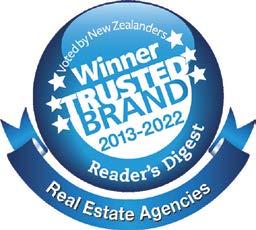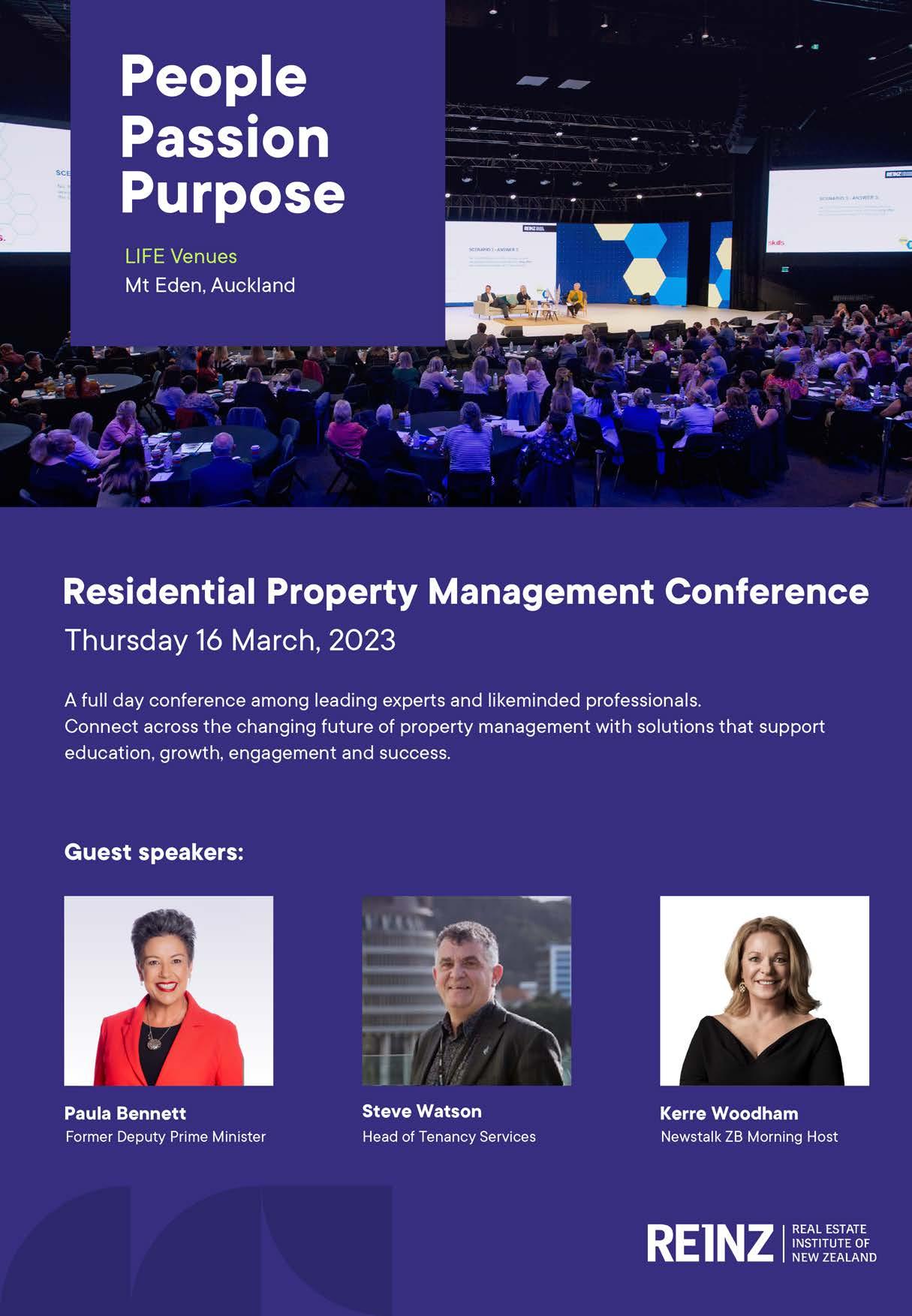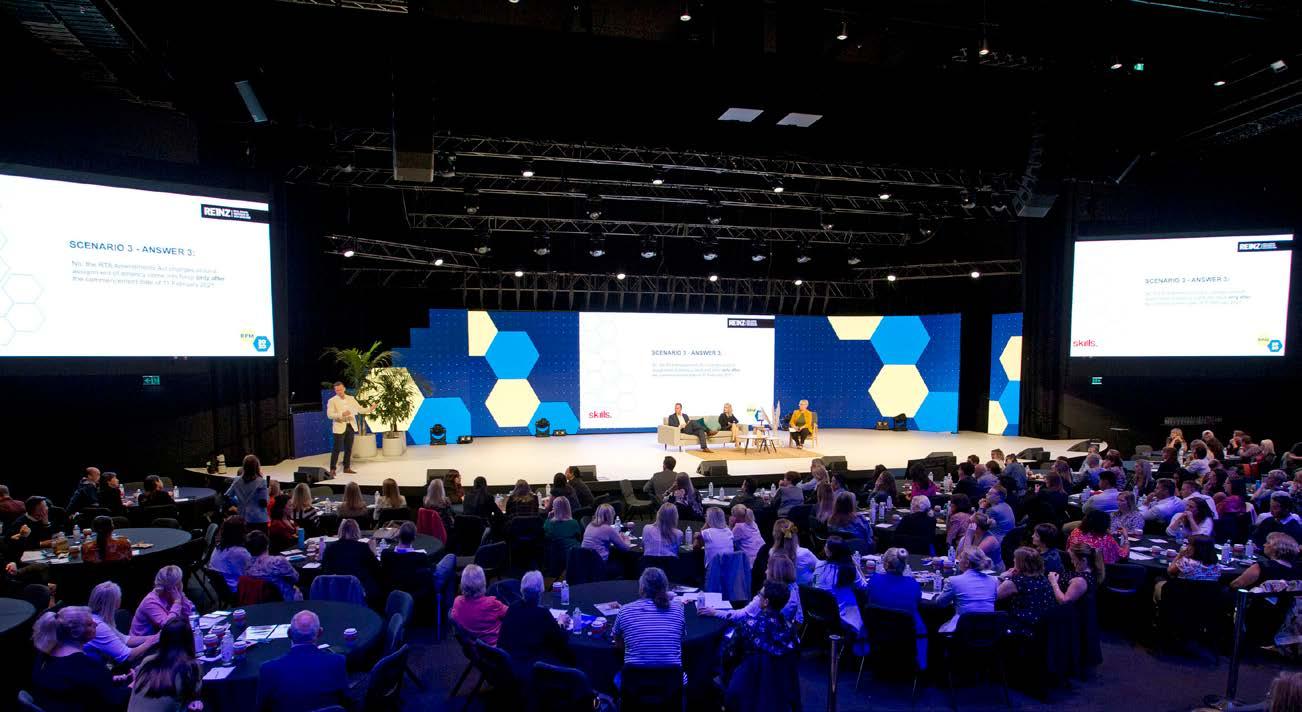RealEstate

SPRING 2022/SUMMER 2023
▪ 2022 REINZ Awards for Excellence


SPRING 2022/SUMMER 2023
▪ 2022 REINZ Awards for Excellence
Professionals Real Estate New Zealand is a co-operative group founded by Real Estate people for Real Estate people. All fees paid go into providing services to our members and we aim to provide the best value experience for our owners and our clients through independent ownership and collaboration.
We have core areas available across New Zealand and ownership options for businesses at different levels of maturity from start ups to multi office operations.
If you are looking for a step up with a group focussed on the success of its people, go to professionals.co.nz/ownership or contact Nick Reid on 021 721 915 or nick.reid@professionals.co.nz

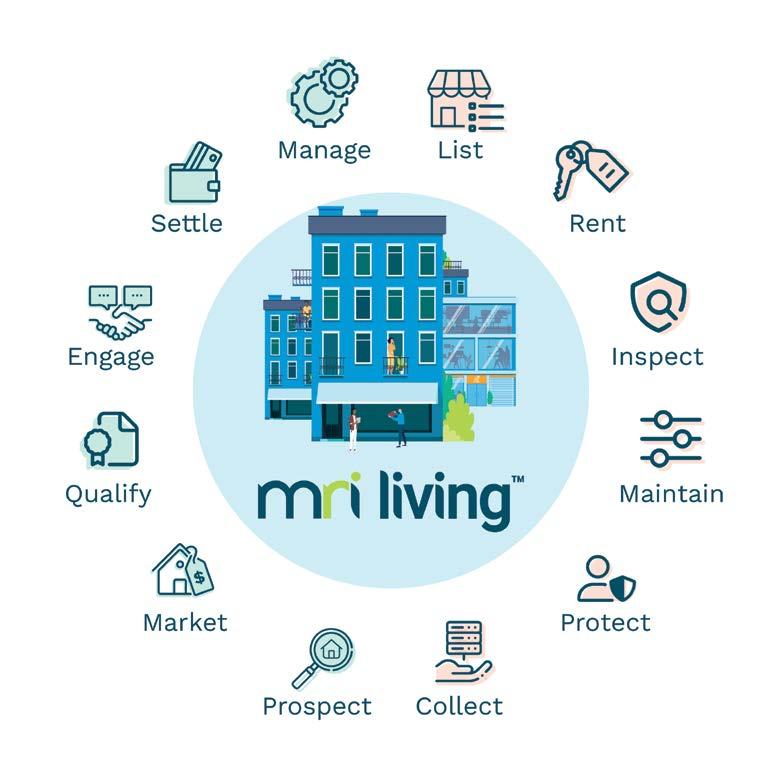
16
2022 REINZ REAL ESTATE NATIONAL AUCTIONEERING

SUCCESS AND SUNSHINE IN TARANAKI
HORTICULTURE PROPERTY MARKET FRUITFUL WORKING SMARTER, NOT HARDER
ACCESSIBLE REAL ESTATE FOR A NEW AGE
The Real Estate Magazine is a publication distributed to more than 14,000 real estate professionals. Ad packages are available. If you are interested in advertising, contact Eilish Emery – eemery@reinz.co.nz
Real Estate Institute of New Zealand Inc
PO Box 5663, Victoria Street West, Auckland 1142
Phone: 09 356 1755 Free Phone: 0800 473 469
Email: info@reinz.co.nz www.reinz.co.nz
Chief Executive
Jen Baird. Please refer all queries in first instance to
Kirsty Loader, Ph: 09 356 1752, kloader@reinz.co.nz
Advisory services
Melisa Beight, General Counsel
Ph: 09 356 1760, mbeight@reinz.co.nz
Membership team
Mary Rackham, Membership Services Manager
Ph: 09 356 1750, mary@reinz.co.nz
Karen Chambers, Membership Services Admin
Ph: 09 356 1845, kchambers@reinz.co.nz
Cindy Stowers, Membership Services & Web Admin
Ph: 09 356 1849, cstowers@reinz.co.nz
BUILDING A SUSTAINABLE FUTURE

EXPOSED: HIDDEN COSTS WHEN SELLING
AML, EASY AS A-B-C?
ADVERTISING WITH SURVEY PLANS
Events
Ph: 09 356 1755, events@reinz.co.nz
Communications
Marie Cahalane, Head of Communications & Engagement
Ph: 09 356 1755, mcahalane@reinz.co.nz
Education
Chris Campbell, Head of Education
Ph: 09 356 1755, ccampbell@reinz.co.nz
Property management
Joanne Rae, Head of Property Management
Ph: 09 356 1755, jrae@reinz.co.nz
Technology
Miles Fordyce, Chief Digital and Innovation Officer
Ph: 09 356 1761, mfordyce@reinz.co.nz
Finance
Rowan Dixon, Chief Financial Officer
Ph: 09 356 1762, rdixon@reinz.co.nz
60 RECENT CHANGES TO OVERSEAS INVESTMENT
Become a Member Benefit supplier. Contact marketing@reinz.co.nz
Want to sponsor a REINZ event? Contact events@reinz.co.nz

PropertySmarts Call REINZ Membership on 0800 473 469, option 1

Editors Marie Cahalane, Editor-in-Chief; Eilish Emery, Editor; eemery@reinz.co.nz
Design and layout
MacWork Design & Print blair@macwork.co.nz
DISCLAIMER: Any views or opinions included in this publication do not necessarily reflect the views of the Real Estate Institute of New Zealand Inc but remain solely those of the author(s). REINZ is grateful to the companies who have advertised in The Real Estate magazine who enable us to bring this publication to our members. However, placement of advertising in this publication does not constitute an endorsement of the products and/or services shown. Neither is REINZ responsible for the accuracy of any advertising material.
考虑购买? 安排好您的财务 您能借到或能负担得起多 少钱?购买新房会带来额 外的费用,您需要为其做 出预算。在申请房屋贷款 之前,先调查清楚并了解 您的贷款选择和限额。 组建起您的支持团队 您需要一位律师、一家保 险公司和一家银行或抵押 贷款经纪人。您以后可能 还需要一名房屋检查员。
就您的目标达成一致 确定您想要找什么以及 您的目标是什么。与朋友 和家人谈一谈。
了解术语 您准备得越充分,整个过程 就越清晰了然。了解销售方 法、房产所有权类型以及如 何识别风险和潜在问题。 参观开放房屋或安排私人看房 至此,您将知道您想要什么样的房 子以及需要注意什么危险信号。如 果您喜欢一个房子并且它满足您的 需求,您可以让经纪人知道并开始 对其进一步更详细地研究。
您可能要重复
•您可以为您的出价附加条件。卖方也 可以为销售加一些条款和条件。
•您可以随时出价。
出价 交割和 Me pānui, ā, me mārama hoki koe ki te whakaaetanga whakarite mua te waitohutanga. Me rapu tohutohu ā-ture hoki koe
使用 settled.govt.nz的房产检查工具 tari whakaaetanga noho ki wātaka, papanoho





价。卖方可以选择通过经纪人与任何 出价的人进行谈判。 出价后,您可能没有机会进行谈判,因 此请考虑给出您的最佳出价。 以投标方式竞买,除非提前售出 有些以投标方式出售的房产可以在截 止日期之前出售,这应该在广告中着重 说明。 如果卖方决定在投标结束日期之前接 受买方出价,则该房产可以在该日期 之前出售。 通知经纪人您的买房意图,并要求如 果有其他人在结束日期之前出价的 话,请通知您,看看您是否也可以出 如果卖方决定在结束日期之前接受买 方出价,并且有多个买主出价,则销售 可能会变成多方出价的流程。通过拍卖竞买 房产拍卖是一种快节奏的公开拍卖。在 达到卖方的底价后,房子出售给出价最 重要的须知事项 买方应告知经纪人其买房意图,并要 求如果有其他买家在拍卖日期之前出 价时,得到通知。 如果您以前没有参加过拍卖会,最好 以旁观者的身份去看一场拍卖,这样 您就可以了解其运作方式。 如果您赢得拍卖,您就有义务购买该 房产。您必须在拍卖当天支付购买押 金。在您考虑在拍卖会上出价之前,务 必将您的购房款安排好并完成您作为 买家的尽职调查,这非常重要。 无论使用的是哪种出价流程,请记住买
了解各种问题和风险隐患 做好功课意味着您可以做出明 智的决定,例如,您将会了解到 邻里社区以及该地区可能发生 的自然灾害类型等情况。
让settled.govt.nz的买房人 购买房屋是您将做出的最大财务决
了解术语 您准备得越充分,整个过程 就越清晰了然。了解销售方 法、房产所有权类型以及如 何识别风险和潜在问题。 参观开放房屋或安排私人看房 至此,您将知道您想要什么样的房 子以及需要注意什么危险信号。如 果您喜欢一个房子并且它满足您的 需求,您可以让经纪人知道并开始 对其进一步更详细地研究。
使用 settled.govt.nz的房产检查工具
压力很大的过程。 Settled.govt.nz
mua te waitohutanga. E wātea ana te whakaaetanga whakarite te reo Ingarihi anake. Ka hiahia pea koe ki te āwhinatanga whakawhiti mehemea ehara te reo Ingarihi tō reo matua. Me mātua whiwhi koe tētahi kape o te whakaaetanga whakarite kua waitohutia roto te 48 hāora muri mai te waitohutanga.
入住
意味着您能够 在知情的基础 上做决定 mātua mōhio koe mō ngā whakarite whakaaetanga whakarite

为止的整个过程。
提前做好功课 āwhina
Ahakoa mā te mātanga koe e āwhina ki te haina, ka noho kē tō kirimana waenga a kōrua ko te tari hoko papanoho e mahi nei te mātanga. Kei te āhua o ngā herenga o te whakaaetanga whakarite, kia oti a koe te whakarārangi tō papanoho, ka āhei ngā mātanga katoa o te tari hoko papanoho te āwhina a koe ki te hoko atu. Me mātua mahara ake ko ngā mātanga katoa a te tari hoko papanoho, e mahi ana māhau ahakoa ka rapu rātou ā rātou ake kaihoko mai. Kei te hoko atu koe i tō papanoho?
了解各种问题和风险隐患 做好功课意味着您可以做出明 智的决定,例如,您将会了解到 邻里社区以及该地区可能发生 的自然灾害类型等情况。
settled.govt.nz 帮助您成为自信 的买房人


购买房屋是您将做出的最大财务决
为交割日做好计划 有些事情需要在交割日 之前完成,例如您的交割 前房屋检查以及确保您 的贷款和保险都已到位。
从了解 LIM,到买卖协议,再到何时联系律师,settled.govt.nz 逐一解答您需要知道的事。访问settled.govt.nz
31/08/22 12:22 PM
压力很大的过程。 Settled.govt.nz
有意购买但
做好功课 当您找到想要购买的房产 时,在出价之前了解尽可 能多的信息非常重要。
看一下清单、测验、视频和工具。 LIM,到买卖协议,再到何时 settled.govt.nz 逐一解答您需要知道的事。 settled.govt.nz 了解更多信息
为交割日做好计划 有些事情需要在交割日 之前完成,例如您的交割 前房屋检查以及确保您 的贷款和保险都已到位。
在交割日进行交割 大日子到了!许多事情需要在您的律师、卖方 的律师和银行之间依次走完程序,然后房产才 能够属于您。这可能需要一些时间,您可能要 到当天晚些时候才能拿到钥匙。计划在交割日 后的第二天再搬进去,不失为一个好主意。
找到中意的房产 可能需要花费一 段时间
房地产管理局 Settled.govt.nz 由房地产管理局 提供– Te Mana Papawhenua (REA) 房地产管理局(REA 房地产行业的独立政府机构。)是监管新西兰 我们的宗旨是促进和保护购买和 销售房地产的消费者的利益,增强 公众对房地产经纪人服务的信心。
如果出现问题,请先与房地产经纪 人或其经理讨论您的疑虑。所有的 中介公司都必须有解决投诉的内 部程序。 如果您无法与房地产中介公司解 决问题,或者您不愿意与他们讨论 局这些问题,您可以联系房地产管理 (REA)。如果您的投诉与房地产 经纪人有关,我们可以通过多种方
We have redesigned and updated the REA consumer guides to the residential agency agreement and residential sale & purchase agreement, as well as our real estate buying journey guide. They are now available in both digital PDF and professional print versions.
Translations of the three guides are also now available in Māori, Tongan, Samoan, Hindi, Korean and Simplified Chinese.
• Licensees must provide a copy of the English version of the relevant statutory guide to buyers or sellers of residential property, before an agency agreement, or a sale and purchase agreement is signed



• From 14 October 2022, the new English guides, must be supplied (in digital PDF or physical form)
• Translated versions should be made available on request and offered where they may assist with consumer understanding
To download digital guides and order printed brochures, visit the Resources section of our website: rea.govt.nz/resources
式提供帮助。例如,我们可以帮助 您和房地产经纪人或中介公司解 决问题,并提醒他们其在《2008 房地产经纪人法》项下的义务。当年 您联系我们时,我们将与您合作, 帮助您确定最好的办法。
本指南有其他语言版本。您可以在此处找到本指南的翻译副本 settled.govt.nz/resources
Lo and behold, a Megatrends-themed magazine issue — helping us build today for tomorrow.
Megatrends are structural shifts; they are longer-term in their nature, and their effects cause real change in the world around us. Earlier this year, we published a Megatrends report identifying the megatrends likely to impact the New Zealand real estate market in the coming decade.
In this issue, you'll find articles themed around some of the trends featured in the report. From digitisation (pages 24 and 40), rental reality (page 32), climate and sustainability (pages 46 and 48), urbanisation (pages 21 and 48) to generational expectations (page 40). Exploring these megatrends on a deeper level will ensure you are across some of the possible industry disruptors and what they mean for you and the future of real estate.
Tis' the season of events at REINZ. We saw three action-packed days of auctioneering greatness in June during the REINZ National Real Estate Auctioneering Championships. Congratulations again to our winners — you can read about their tips and tricks on the trade on page 16.
It was wonderful to host four different events in Auckland, Wellington, Christchurch and Queenstown to celebrate National Property Managers' Day on 6 July. REINZ was delighted to champion this new recognition day, which celebrates property managers' hard work and resilience nationwide.
It was fantastic to see so many of you at our 2022 REINZ Awards for Excellence — what a night that was! Congratulations to all our winners and finalists. Read more about the Awards night and winners on page 12.
But there's more to come. Our flagship real estate conference, NZRE Conference — is here. We have a stellar lineup of speakers, including Marty Fox, Founder and Director of WhiteFox, Jacqui Maguire, Organisational
and Clinical Psychologist, and Tom Panos, Founder and Director of Real Estate Gym.
Lots of exciting movements have been happening at REINZ. You may have seen our newly launched property podcast — Real Estate of Mind. We are looking at more new and exciting ways to engage, inform and inspire you, and our podcast is there to do just that. We talk all things real estate — from auctioneering, what conversations to be having with vendors and buyers right now, deep dives into regional markets, property management and much more. You can check us out on Spotify to join in on the conversation.
Our magazine has recently shifted to a bi-annual publication. Changing its frequency enables us to provide you with high-value print and online content, ensuring we hit the mark with what you want to know and need to know. If you have any content suggestions for us, feel free to email communications@reinz.co.nz.
I visited the United States in August, attending the National Association of Realtors (NAR) Leadership Summit and the American Society of Association Executives (ASAE) Conference. It seems that the States are beginning to see a change in their market after two years of record-breaking growth — sales volumes and price growth are slowly easing. It was great to connect with other associations, discuss ways to continue adding value for members and be at the forefront of changes in how membership organisations see the future.
It was a very valuable time away with lots of takeaways that we'll start delving into at REINZ to ensure that, as always, we are keeping our finger on the property pulse and providing you with the best service and information out there.
Ngā mihi, Jen Baird
With so many changes happening throughout the profession, from digital innovation and legislation to market volatility — it is vital to be in the know and on the pulse of everything happening around you.

As a young agent starting out, this is the brand you want to aspire to. I still feel the same excitement as when I first started.
There’s a lot of experienced people that you can lean on for knowledge and support. Everyone wants you to succeed.
It doesn’t feel like work to me.
For the fifth season in a row, Ray White will be the exclusive agency partner for Three's The Block NZ Back on screens for its 10th season, The Block NZ: Redemption is sure to present some exciting twists and turns. Located in the beachside suburb of Orewa, just 45 minutes north of Auckland's CBD, there's something for the whole family. Orewa brings together location and lifestyle for the ultimate living experience, with markets, eateries, parks, and fantastic schools.

New Zealand Sotheby's International Realty (NZSIR) took home the official title of 'Best Real Estate Agency 5-20 Offices New Zealand', having been awarded the only five-star accolade in its category.
The Asia Pacific International Property Awards are judged by an independent panel and identify the highest achievers in the property industry, from architecture and development through to interior design and real estate. Mark Harris, NZSIR Managing Director, says winning the award is an honour for the company and symbolic of the talent and dedication of NZSIR agents and team members across the country and its head office in Queenstown.
"We are thrilled to win this award and be recognised as leaders in our industry in the Asia-Pacific region. NZSIR has enjoyed an extraordinary year in terms of sales and achieving record results for our vendors, and this award is an extension of that," says Harris.
NZSIR also won the Best Real Estate Agency Marketing New Zealand award. The accolade automatically makes NZSIR a contender to win the Asia Pacific regional award and, if successful, a finalist in the upcoming International Property Awards, to be held in London later this year. The International Property Awards determine the world's finest property companies.
Forbes Global Properties — a curated consumer marketplace of luxury homes and an invitation-only membership network of top real estate firms, has proudly welcomed boutique brokerage PQ Property Intelligence to its prestigious ranks.
PQ Property Intelligence provides purchasers and vendors with local knowledge and international capabilities, offering a full-service package from acquisition through to settlement. It is the first firm to be awarded membership in New Zealand, where it will exclusively represent the brand.
Headquartered in Wellington, PQ Property Intelligence is headed by prime property expert Anthony Morsinkhof. Along with his deep experience in the residential home market, Anthony has also developed a strong reputation in sourcing and selling significant property developments both overseas and in New Zealand.
"Our team of top-tier property specialists is dedicated to providing clients with the very best market knowledge and the finest international exposure for their homes," says Anthony Morsinkhof, Managing Director of PQ Property Intelligence.
"The Forbes Global Properties network and its exclusive marketing services offer an unrivalled global platform for presenting luxury properties in New Zealand to both a local and international buying audience," he concludes.


NZ Real Estate (NZR) is currently located in six locations across the Lower North Island and has recently celebrated the opening of new premises for their Feilding franchise.
What was a semi-industrial building in the main street of town (Kimbolton Road) has had a major refit done, creating an office environment on par with any high-end professional office.
NZR was started just over eight years ago in Feilding by owners Peter and Nicola Barnett, and until recently, operated from the former doctor's surgery rooms located at the front of their home at 20 Kimbolton Road. Other founders, Jamie Proude and Blair Stevens, own other offices as well as other franchises in Gisborne and Napier.
"We are lucky that the industry offers the potential for people to progress to ownership; it's definitely been the best financial decision we have ever made," says Peter Barnett.
In a world first, the Ray White Group has successfully trademarked the phrase 'Competition Creators'.

The phrase was coined by the group's chairman Brian White AO and is now interwoven into the everyday language at Ray White when referring to auctioneering and the auction process.
A trademark is a type of intellectual property consisting of a recognisable sign, design, or expression that identifies products or services from a particular source and distinguishes them from others.
Ray White now has the term registered in Australia, New Zealand and Indonesia. This trademark distinguishes Ray White's group from all other real estate businesses.
Ray White's high-performance national training focuses on creating competition in all markets.

Property Brokers has expanded its commercial and industrial property market presence in Tauranga — marking the third branch for Property Brokers in the wider Tauranga location.
"Philip Hunt and his team are proven performers and have built an enviable business and reputation across Tauranga. We are excited to expand our commercial holdings across New Zealand and, in particular, Tauranga City. It's a significant growth corridor for the industrial and commercial sector in the North Island," says Simon Short, Property Brokers' Bay of Plenty and South Waikato Regional Manager.
Under Hunt's ownership, Ray White Commercial Tauranga enjoyed a significant market share of Tauranga's real estate for many years and was recognised as the Top International Branch for Customer Service for five years in a row.
"We've long respected and admired Property Brokers, their infrastructure and associated networks are massive, and their marketing and network reach is something which I know our clientele will truly benefit from here in Tauranga," says Hunt.

For 45 years, Lou Newman has been a part of the rich blue fabric that makes up Harcourts. Having achieved this milestone in July, he was presented with his special Long Service Award at the Harcourts Wellington Region Quarterly Awards in August.
Lou has been a business owner, manager, and auctioneer over the years, and Harcourts greatly appreciate everything he has done for the business over his long tenure.
Old Hollywood Glamour was the theme at the 2022 Wallace & Stratton Annual Awards evening held at the Royal New Zealand Yacht Squadron.

Entertainer extraordinaire of stage and screen Jackie Clarke, hosted the evening. She had the audience in the palm of her hand as the team celebrated the best of the best for the previous year.
Highlights of the night included the announcement of the Wallace & Stratton Award that went to Taylor Serage and the Rising Star award that Tamara Markovic won. Top Seller Award (Properties) in residential went to Keri Gerrard, while (Volume) was won by Sarah O'Gorman. In developments, Mitchell Eades won both top awards achieving the highest number of properties and volume throughout 2022.
Top listing awards went to Keri Gerrard in residential and Scott Gordon in developments. The top sale by dollar value for the previous financial year went to Terry and Janet Jones with a property they sold in Kumeu.
LJ Hooker agents asked the public if they ever wanted to push a real estate agent out of a plane. Why, may you ask? To raise funds for the Cancer Society with a skydive — a jump for cancer initiative.

Collectively, members of the LJ Hooker Family from Auckland, Matamata, Palmerston North, Oamaru, Lake Tekapo, Twizel, and Dunedin raised nearly $30,000 as part of its fundraising effort.
Vicky Ward from LJ Hooker Pukekohe was the driver behind the fundraising initiative. At first, she was surprised members across the LJ Hooker network supported the idea.
"The support from the LJ Hooker Family was just amazing — the fundraiser blew up! We had agents from all over the country joining in — even agents we haven't met were keen to put themselves out there for a great cause," says Ward.
At the end of the fundraiser, 18 members of the LJ Hooker family, including salespeople, property managers and administrators, had to walk the talk, putting on a brave face as they jumped for cancer.
Harcourts Cooper & Co are proud to encourage tamariki on the North Shore to participate in the North Harbour Junior Rugby school tournaments. This year, 67 primary schools and 15 intermediates participated in the events, including an incredible 97 non-contact female teams spurred on by a North Harbour Rugby drive — encouraging more female primary school students into the sport.

Cooper & Co's community relationship programme has supported the tournaments for five years. The positive feedback received this year from schools and families stems from the long-awaited opportunity to get large groups of children together safely in an outdoor environment after the challenges of COVID-19.
Martin Cooper, Managing Director at Harcourts Cooper & Co, says the tournaments provide great opportunities for young people to give tackle and rippa rugby a go, be competitive, have fun, and develop skills and a good understanding of the game.
"We take our Coffee & Cone van along to some of the tournament days, and the proceeds go back to the local rugby club where the tournament was held on the day. It's great fun, and our communities really appreciate it."
Cooper & Co's community relationship team supports more than 1,800 community groups, including local school fairs and running events, swimming carnivals and Santa parades.
The 17th annual Hawke's Bay Charity Auction saw Property Brokers raise more than $70,000 for Hawke's Bay charities and the Community Fund.
Four hundred people attended the auction to support Hawke's Bay Cancer Society, Hawke's Bay Rescue Helicopter, and the Property Brokers Hawke's Bay Community Fund.
The auction event didn't disappoint, with sensational items and experiences up for grabs. The sell-out evening saw 44 items auctioned and an additional 38 items in the silent auction.
"It was another really successful event; hundreds of people came together at the Toitoi Hawke's Bay Arts and Events Centre in Hastings to have a great time and bid up large," said Joe Snee, Property Brokers Hawke's Bay Regional Manager.
"This amazing result wouldn't have been possible without the hard work of the incredible Property Brokers team, our generous sponsors and supporters, and the wonderful Hawke's Bay community who put their hands in their pockets to support these wonderful causes."


Principal at Ray White Papanui, and REINZ Regional Ambassador in Christchurch
Did you always want to be a real estate professional?
No not at all, it wasn't even on the radar. Once I completed my business degree, I took an office job and it just so happened to be on the front desk of a real estate company! The rest is history and 17 years later I am now a business owner.
What do you love about what you do?
It's a profession where the harder you work the more you can earn and there aren't too many careers you can say that about. It's also varied and challenging, every day is different!
What is the best advice someone has given you about real estate?
Trust the process. Don't speak on behalf of your vendors, always present interest to them. Robust vendor communication is key, you can't have too much. Don't turn the buyers and sellers against each other in negotiations,
it won't help. Instead, express the gratitude from each side for their interest, their offer, and their participation in the negotiations and so on.
What is your top tip to someone starting out in real estate?
Have the ability to float yourself financially for 12 months and start in a successful team — it is hands down going to give you the best springboard in your career versus trying to start out alone.
When you’re not on the job, how do you like to spend your down time?
Planning renovations, working in the garden, moving furniture around at home (drives my husband nuts), watching property renovation programs, reading home magazines, listening to podcasts, writing editorial content for my social media accounts, I am one big property geek!
To hear more from Vanessa, check out REINZ’s property podcast Real Estate of Mind. In Episode 3, Jen Baird, Chief Executive at REINZ and Vanessa explore the Canterbury market, the importance of bringing emotional intelligence to the fore of every transaction, how to find the perfect balance of being professional and personable, and more. Listen to the podcast on Spotify.
Barfoot & Thompson brought together over 600 of their people to show support for the Starship Foundation's life-changing work in an evening filled with laughs, celebrities, good food and friendly competition.

Branches, internal departments, executives, and suppliers teamed up to bring their unique knowledge and competitive flair to the evening, all while uniting to support the company's longstanding and largest community outreach effort — the Starship Foundation. The event was an opportunity to celebrate the people at Barfoot & Thompson's fundraising contribution over the years — across an individual, branch and brand level. As a five-star partner for over 19 years, the company's efforts have contributed to state-of-the-art medical technology, refreshed and modern procedure rooms and wards, and the Neonatal Transitional Care Unit — an industry-leading and New Zealand first in best practice care.
The night raised over $268,000 for the Starship Foundation — their largest fundraiser to date. Barfoot & Thompson would like to extend their greatest thanks to all their generous guests, sponsors, donors and volunteers who made the night an incredible success




‘Twas a night of glitz and glamour at the 2022 REINZ Awards for Excellence. More than 550 of New Zealand’s top real estate and property management performers gathered to celebrate success across the industry. After a year’s hiatus from hosting the Awards in person, the excitement built — making it a fantastic evening for all.
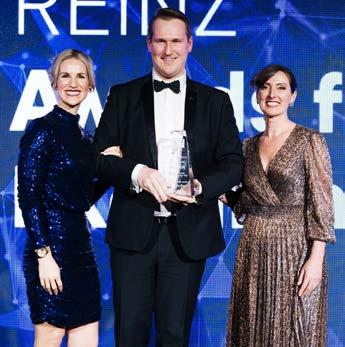
Hip-hop crew Identity Dance Company — returning from the World Hip Hop Championships in the United States where they placed second — performed a fierce and high-energy opener — amping the audience for the night of celebration. Seven Sharp’s Hilary Barry MC’d the evening, and REINZ Chief Executive Jen Baird opened the ceremony with a whakatauki. The evening saw 41 awards presented to individuals, offices and agencies from various sectors of the profession. Following the event, Jen Baird congratulated all winners and finalists on their outstanding achievements.
“Congratulations to all our finalists and winners of the 2022 REINZ Awards for Excellence. After the challenges of last year which saw our Awards adapted into a virtual ceremony, it was wonderful to come together and celebrate in person again. Every year we see such a high calibre of entries submitted, and this year was no exception.
“Thank you once again to our remarkable group of finalists and winners who continue to deliver world-class results for their clients and customers,” concluded Baird. Thank you to our long-standing sponsors who make this event possible; Skills, realestate.co.nz and ABC Photosigns.
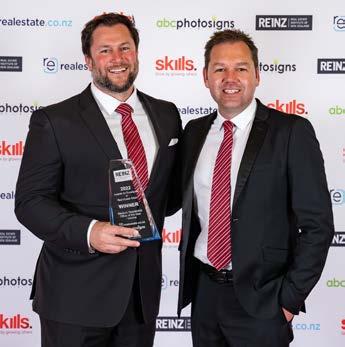

Residential Property Manager — Rising Star of the Year: Minna Zhang – Rempstone Property Management
Residential Property Manager of the Year: Jen Neil – Harcourts Grenadier Accommodation Centre
RPM Business Development Manager of the Year: Lynne Cawthorn – Harcourts Holmwood, Edgeware
Small Office of the Year: Rempstone Property Management
Medium Office of the Year: Ray White Best Property Management
Large Office of the Year: Harcourts Grenadier Accommodation Centre
Blair Stevens – NZR – NZ Real Estate
Innovation Award
Hannah Walker – Proppy.co.nz
Small Winner: Cristina Casares – Ray White Damerell Group, Ponsonby
Medium Winner: Harcourts Cooper & Co
Large Winner: Barfoot & Thompson
Manager of the Year: Blair James – James Group
Office Administrator of the Year: Sara Samuel – Lowe & Co Realty, Wellington
Personal Assistant of the Year: Greer Morris-Clarke –Harcourts JK Realty, Mt Albert
Residential Rising Star of the Year: Linh Yee – Ray White Black Group Realty, Epsom
Residential Salesperson of the Year — Volume: Cameron Bailey – Harcourts Gold Papanui, Christchurch
Residential Salesperson of the Year: Cameron Bailey –Harcourts Gold Papanui, Christchurch
Small Residential Office of the Year — Volume: Opes Real Estate, Christchurch
Small Residential Office of the Year: Bayleys Mat Andrews Real Estate, Wanaka
Medium Residential Office of the Year — Volume: Property Brokers, Whanganui
Medium Residential Office of the Year: Bayleys Ponsonby, Auckland
Large Residential Office of the Year — Volume: Tommy’s Real Estate, Wellington City
Large Residential Office of the Year: Tommy’s Real Estate, Wellington City
Business Brokerage


Business Broker Rising Star of the Year: Jeremy Pak –LINK Business Brokers, Auckland
Business Broker Salesperson of the Year: Linda Harley –ABC Business Sales, Tauranga
Small Business Brokerage Office of the Year: ABC Business Sales, Tauranga
Medium Business Brokerage Office of the Year: LINK Business Brokers, Bay of Plenty
Large Business Brokerage Office of the Year: LINK Business Brokers, Auckland
Commercial and Industrial
C&I Rising Star of the Year: Sam Fitzgerald – CBRE, Auckland
C&I Salesperson of the Year: Greg Goldfinch – Colliers, Highbrook
Small C&I Office of the Year: Colliers, North Shore
Medium C&I Office of the Year: Colliers, Highbrook
Large C&I Office of the Year: Bayleys House, Auckland
Rural
Rural Rising Star of the Year: Brent Irving – PGG Wrightson, Dunedin
Rural Salesperson of the Year: Karl Davis – Bayleys Success Realty, Hamilton
Small Rural Office of the Year: Bayleys Whalan & Partners, Christchurch
Medium Rural Office of the Year: Bayleys Success Realty, Tauranga
Large Rural Office of the Year: Bayleys Success Realty, Hamilton
Small Agency of the Year: Bayleys Southern NZ Realty, Queenstown
Medium Agency of the Year: Bayleys Real Estate
Large Agency of the Year: Barfoot & Thompson



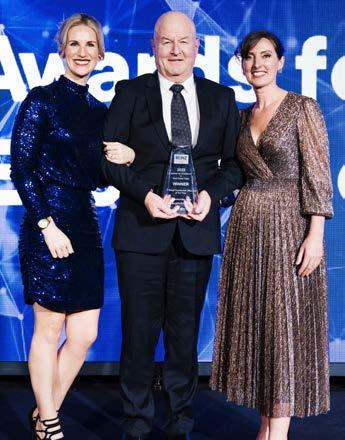





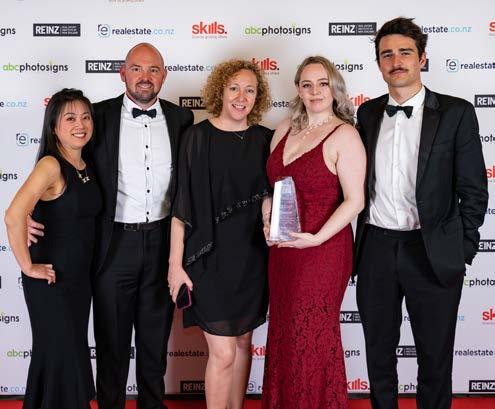







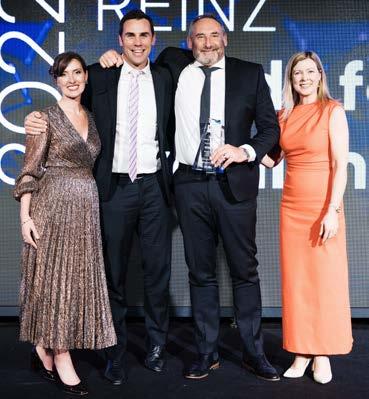




In June, the REINZ Real Estate National Auctioneering Championships saw the country’s most talented auctioneers take the stage. It’s a frenzied three days as our competitors call their way to the champion title. Our 2022 division winners and Chief Judge Mark Sumich, spill the beans on what makes a good auctioneer a great one, their journeys to the auction room, advice for auctioneers in the current market, and how to use a hybrid of humour and wit to create a captivating auction experience.
auctioneer is one who can — week-in and week-out — add value to their salesperson and be relied upon to create an atmosphere that will encourage people to participate.
As we look back at the REINZ Real Estate National Auctioneering Championships, it appears those who can relax and bring an element of humour and enjoyment to their call are most likely to succeed.
When I was 18 years old, tallying up the results at my local rugby club, a bloke came up to me and told me to take up auctioneering: “It’s going to be the next big thing in real estate,” he said.
He was right. Auctions have evolved into a successful and process-driven way to exchange real estate. I saw it as a genuine option, and after studying and performing it full-time, I fashioned it into a fun and eventful career.
Our current market is an excellent test of an auctioneer’s abilities. We often deal with a single buyer, meaning basic life skills and patience are essential attributes. The negotiations undertaken off the floor have become a pivotal part of this (now) wider role of either selling the property or making it more saleable.
While the rewards in our industry are often determined by the competitions, a great
On the first day of the Championships, we saw Faith Tupuhi from Diocesan School for Girls take out the REINZ Auctioneering Schools’ Championship title. The sheer unbridled joy shown by Faith was a sight to behold. In her second attempt at the title, she fought off several from her campus and numerous other excellent performers.
We then saw Karin Attwood from Harcourts Cooper & Co mesmerise the audience and win the coveted Colin Brown Memorial Cup as the Rising Star Division winner. Whilst Karin works in an auction-focused office, her journey to success was essentially through her determination and steely resilience, which enabled her to handle pressure.
The Open Division has been the springboard for many strong callers to gain confidence before moving into the Premier ranks. This year, Brayden Coldicutt performed an incredible display of arithmetic authority, wooing the crowd and the judges. A fine Harcourts salesperson in his own right, Brayden’s future in our craft looks particularly promising.
After dead-heating for the Premier title last year, Conor Patton of Bayleys Real Estate left no stone unturned in his desire to win it outright in 2022. Honing the perfect combination of humour, wit, numerical accuracy, empathy, and patience to dominate a strong Championship division. Conor and runner-up Robert Tulp from Apollo Auctions will represent New Zealand in the Australasian Auctioneering Championships this October.
Aaron Davis, an auctioneer from Harcourts, ran a half-day introductory course that I attended. At the same time, Travers Smyth, an auctioneer from Harcourts Cooper & Co, sent me a link to the REINZ course Mark Sumich delivers, so I booked in for February, and that’s when things got real.
How did you feel when you won the Rising Stars Division?
I thought my call went well. I had two tongue twisters in there, but I knew if I could roll those out without issue, I’d get through comfortably. I managed that and got positive feedback from the judges on completion. There were a lot of shocked people, but no one was more shocked than me when they called my name as the winner. When people talk to me about it now, there are still parts I can’t remember because I got such a big fright!
The entire experience of competing has been amazing. I have learned an immense amount about the auction process, and I am very grateful for all the help and support I received. I’m glad I was brave enough to give it a go; with many nerve-wracking moments and not having called an auction before, I was proud to achieve such an outcome.
Karin Attwood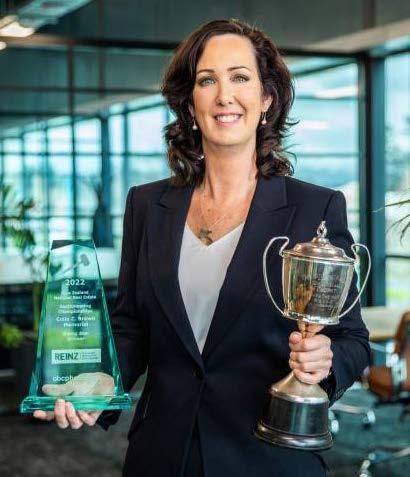
How did your journey into auctioneering begin?
I started in real estate in 2020, joining Harcourts Cooper and Co. They have a strong auction focus and their own auctioneer team. I immersed myself in their auctions and attended auctions every Thursday until we went into a COVID lockdown, then I would watch the live stream instead.

I didn’t realise there were auction competitions until I attended the Harcourts Conference last year. Travers Smyth, one of our agents, was competing in the Rising Star Division, and we went to support him. I’ve always been up for a challenge. So after a few wines at the conference dinner, I decided to give it a go too. Unfortunately, I made the mistake of voicing my intent, which meant I had to front up and follow through with it!
What made you want to become an auctioneer?
I’ve always been interested in how auctioneers can add so quickly and think
on their feet. But I think the biggest thing for me was relating it to theatre. I have done shows since I was very young, and the actual auction day always reminded me of putting on a performance. So, that part of it was what stuck with me and made me want to see what it was like.
What is an auctioneer’s role in negotiation? How does that play out?
An auctioneer has one of the biggest roles in negotiation, especially on auction day. However, this doesn’t just start on the day itself. The negotiation is through the entire process with the vendor and potential purchasers. Our role is to ensure the vendor walks away with the best possible offer in the room and to ensure that they receive certainty in their real estate goals. If the property isn’t sold on the day, the auctioneer has still negotiated the best result for the owners to get an efficient result post-auction.
When you are at auction, how do you make first home buyers feel comfortable while satisfying the more seasoned buyers attending?
When I am made aware that it’s someone’s first time attending an auction, I will sit with them before the auction to make sure they understand how the process will play out. There would be nothing worse than sitting in a room and having an auctioneer speaking to you in a language you don’t understand. We do this every day; however, some people may only do this once in their life. So, I explain the process from start to finish, let them know what terminology will be used and when, and then answer any questions they may have. This ensures they have more clarity on the experience and makes them quite relaxed and excited, hopefully encouraging them to bid accordingly.

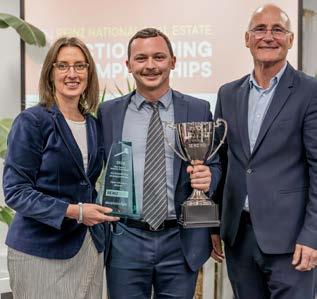
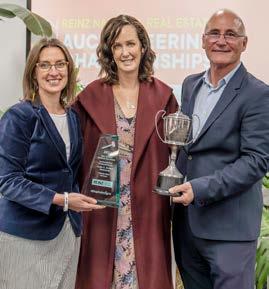

negotiation, and spontaneity. I went to a REINZ auctioneering course run by John Abbott and was instantly enthralled by it all. From there, it was a steady progression to gain the trust and confidence of colleagues to begin calling auctions, as well as learning and honing the other skills required for all the elements outside of auction day. What is your advice to auctioneers across the country in this current market?
you can make them laugh, or even smile, they will very often bid again. Ideally, it’s a genuine ‘in the moment’ situation, rather than staged one-liners — sure, a few of those in the arsenal are handy to have, but the great moments are always the real ones. Generally, humour and the ability to relax a room is important, as nervous buyers don’t feel they can give it their best shot if they don’t feel comfortable.
Conor Patton Bayleys Real Estate Winner of Premier DivisionWhy did you get into auctioneering?
In my early days as an agent, I attended our auction days and was quickly drawn to their fast-paced, dynamic, and ultimately result-driven nature. I began to look at them as the best bits of what we do in real estate, condensed into this wonderful window of activity, dealmaking, emotion,

Patience. We need to be patient with buyers and sellers at auctions — a lot of the time, that fever tempo isn’t there. We are often required to move things along steadily, which is also true with mid-auction negotiations. These take a bit more time, but ultimately that time is incredibly well spent if we can get the deal together there and then for both sides. We also need patience with the agents or offices we work with. Some agents are dabbling in other methods of sale as the fear of an auction not selling on the day has risen. We need to be steadfast, composed, fact-based and results-focused.
How does using humour and wit impact the auction experience?
I have seen time and time again where a buyer says they are ‘out’. However, if
I began to look at auctions as the best bits of what we do in real estate, condensed into this wonderful window of activity, dealmaking, emotion, negotiation, and spontaneity.Faith Tupuhi from Diocesan School for Girls, winner of Schools Division Conor Patton from Bayleys Real Estate, winner of Premier Division Karin Attwood from Harcourts Cooper & Co, winner of Rising Star Division Brayden Coldicutt from Harcourts Hawke's Bay, winner of Open Division
EVES is a proven leader in the Bay of Plenty real estate market.

From our world-class systems to our extensive network, backed with a highly skilled executive team, we are dedicated to providing branch managers with every opportunity for growth and success.
We are currently looking for two experienced managers to lead our highly skilled teams. If you would like to have the opportunity to lead an award winning team and enjoy an exceptional career, whilst having the beach on your doorstep, then we would like to talk to you.
Talk to our Bay of Plenty General Manager, Karen Worley, about becoming an EVES Branch Manager on 07 579 0646
eves.co.nz/careers
Responding to demand, Auckland has seen an increase in the number of new houses being built. Auckland Council has issued record numbers of residential building consents over the past few years. Over 21,700 consents were issued in the 12 months to July 2022 — a new high, supported by ultra-low interest rates through 2020 and 2021.
Most of this growth has come from multiunit dwellings, such as townhouses and apartments. As a share of all residential building consents, multi-unit dwellings have increased from 20% in 2010, in the wake of the Global Financial Crisis, to a high of 75% in the 12 months to July 2022. The picture is similar in other main centres, with multi-unit dwellings accounting for most building consents in Wellington (74%) and Christchurch (64%) in the 12 months to July 2022.
Townhouses now the dominant share of residential consents
Townhouses — also known as terraced houses — are now the most common type of dwelling being consented. Townhouses began to outnumber consents issued for standalone houses in late 2020. In the 12 months to July 2022, they accounted for 12,700 or 58% of residential building consents issued in Auckland, followed by standalone houses at 5,500 or 25%, apartments at 2,800 or 12%, and retirement village units at 720 or 3%.
The increase in residential consents, and the shift to more townhouses, have been noticeable since the Auckland Unitary Plan became operational in late 2016. The Plan allows for denser types of housing in many areas across Auckland — a change in planning rules referred to as upzoning.
Upzoning increases the number of development opportunities by enabling more intensive development of sites and more efficient land use. In turn, this enables the housing supply to be more responsive to changing demand patterns. While upzoning increases the value of underdeveloped sites relative to their potential, new multi-unit dwellings tend to be lower in price than a standalone house, as land costs can be spread over more dwellings.
Recent Research conducted by the University of Auckland has found that the Auckland Unitary Plan led to a material increase in residential building consents from 2017 to 2021, beyond what would have plausibly occurred in its absence. The additional dwellings are estimated at 26,900, or approximately 5% of the housing stock at the time the Plan became operational. For context, there were approximately 76,000 consents issued in Auckland from 2017 to 2021. The surge helped respond to some pent-up demand following a period of an undersupply of new dwellings.

People have different housing preferences, which can change over a household's lifecycle. Land value patterns indicate that most households prefer a location that offers proximity to employment, transport links, and amenities such as shops, parks or schools. In seeking to optimise their location, some households may prefer to
trade-off space and opt for a townhouse or apartment that consumes less land and offers a price point that suits their budget. A responsive housing supply can meet those preferences, with a variety of housing options in places of relatively high demand.
The trend toward multi-unit dwellings likely to continue
The Resource Management (Enabling Housing Supply and Other Matters)
Amendment Act, passed in December 2021, requires local authorities in the largest and fastest-growing urban centres — Auckland, Hamilton, Tauranga, Wellington and Christchurch — to enable more
intensification. This means allowing for higher density — at least six storeys — in areas of highest demand. Those areas are the walkable catchments around city centres, town centres and near rapid transit stops (train lines and busways). Medium density, such as townhouses, is being enabled almost everywhere else.
Intensification may mean change for some streets and neighbourhoods, particularly in higher-demand areas close to city centres, town centres and rapid transit stops. While this may be welcomed by residents seeking housing options in locations of preference, some existing residents may find the change unsettling. However, there
are benefits to society from providing more housing in high-demand locations.

More density can mean more local services — such as retail, hospitality and public transport services — become viable. Importantly, less restrictive land use rules should reduce upward pressure on house prices over time.
This will give younger people a better chance to form new households — their own home in a location that offers accessibility to the things they value. A housing market that responds to demand in this way offers us a better chance of retaining our young people and attracting talented people from elsewhere.
Urbanisation is megatrend 8 in REINZ’s Megatrends report. Increasing urbanisation in New Zealand is expected — particularly in Auckland, which will likely continue to attract people from rural or outer suburbs, and to a lesser extent, other cities.
The ability to offer improved housing choice, diversity and equity in cities that caters to different price brackets and ages enables people to stay in one area longer. It also opens up more properties transacting, with empty-nesters able to remain in their community but free up the family home for the next generation.
To learn more about the urbanisation megatrend and its implications for New Zealand real estate head to the report section of www.blog.reinz.co.nz/reports-1/megatrends-report-2022.
More density can mean that more local services become viable, such as retail, hospitality and public transport services. Importantly, less restrictive rules over land use should reduce upward pressure on house prices over time.
In Taranaki, our lifestyle is second to none. From epic mountain tracks and trails to the pristine coastline and world-class surf, vibrant urban centres, award-winning gardens and parks, an exploding food and beverage scene, and a diverse and growing events calendar — there is something for everyone.
We’re an attractive alternative to a main centre, offering the best bits of city living, with the richness and additional benefits residing here has to offer. It is easy to achieve an enviable lifestyle in Taranaki, and you don’t need to compromise your career, interests, or your daily coffee fix either.
A snapshot
Taranaki’s population is 124,600, most of whom live in the coastal city of New Plymouth. The region is split into three districts: New Plymouth to the north with a population of 86,100, Stratford in central Taranaki with a population of 9,880 and South Taranaki, which includes the main centre of Hāwera — a population of 28,700.
Invest, live, visit
Taranaki’s workforce has long enjoyed competitive wages and some of the highest rates of GDP in New Zealand, with the highest regional contribution to GDP outside of the main centres — currently sitting third behind Auckland and Wellington.
Our region is home to strong energy and dairy sectors, robust engineering, and primary production, alongside an engrained entrepreneurial spirit. Collectively we’re committed to and progressing towards our transition to a low-emissions, high-value economy, harnessing our regional strengths, talent, and infrastructure to springboard our successes and continue our strong economic contribution.
For instance, the recent launch of nine Branching Out food and fibre investment blueprints. The blueprints represent viable food and fibre opportunities that have the potential to add value to our economy by way of jobs, investment, and GDP, while building sectoral resilience through diversification. Traditionally we have been a major player and leader in dairy, and this isn’t a move away from this sector — it’s more about building others just like it.
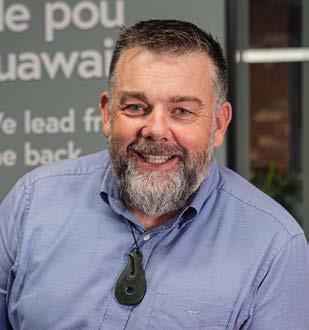
We’re also home to Ara Ake, New Zealand’s new energy centre, and we’re investigating and attracting investment into offshore wind generation in Taranaki. This represents an important energy opportunity for the region and Aotearoa too, supporting our national net zero goals.
Energy and food are supported by rapidly growing tourism and events sectors, and visitors are increasingly becoming aware of our slice of paradise. Year-round we promote our region to visitors, and increasingly we’re hearing that people are making plans to move here — some bringing their existing businesses along with them.
In Taranaki, many can purchase property that big city residents can only dream about, and the vast range of free activities gives locals the time to enjoy a great worklife balance.
In July 2022, the median house price in Taranaki was $620,000; on average, the
median Taranaki property continues to increase in value by 7.5% each year. By district, New Plymouth’s median house price is sitting at $620,000, Stratford at $560,000, and South Taranaki at $460,000. Located in New Plymouth, Taranaki’s most expensive suburb is Waiwhakaiho, which has a median house price of $1,162,300 and is a stone’s throw from some of the region’s best beaches and cafés.
Construction is also underway to develop a multi-million-dollar shopping complex in this area, including speciality retail stores, cinema, offices, and a 75-room hotel, reflecting regional growth and investment into the region.
Over the next 25 years, the New Plymouth District is expected to experience significant population growth, evident in the increase of residential building consents issued by the New Plymouth District Council (NPDC) — up 11% from March 2020 to March 2021.

Coupled with a $1.8 million boost through the Government’s Infrastructure Acceleration Fund (IAF) to cover NPDC’s contribution to the infrastructure required for the 300 new homes planned, and with major building works underway, we expect to see continued economic growth and people in work.
Major projects in the New Plymouth District include the Taranaki Base Hospital upgrade,
with a six-storey building to house many of the hospital’s acute clinical services, and the restoration of the Taranaki Cathedral.
In early 2023, a visionary project led by Taranaki Foundation with mana whenua, NP Partners and NPDC is set to transform New Plymouth’s Kāwaroa Park into a futuristic, family-friendly experience that brings the unique nature, culture, history and stories of the site playfully alive.
In the heart of Taranaki, the Stratford district has also seen significant growth in recent years when it comes to residential building consents — a result of a steady increase in subdivision numbers year-onyear, up 86% in 2021 and 2022, compared to 2016 and 2017. It doesn’t look to be slowing down any time soon either.
Several large infrastructure projects within Stratford cater to this growth and will play a key role in attracting and retaining residents in coming years. The installation of a second water trunk main to increase water supply resilience, full facility upgrades to Wai o Rua — Stratford Aquatic Centre, and the new bike park project that is a constant hum of activity and drawcard for visitors and families from our neighbouring areas are some of the highlights.
To learn more about Taranaki’s growth, visit taranaki.co.nz.
Working and living in Taranaki New Zealand’s sunniest region brings many benefits, and one of those is time. Say goodbye to the commute and hello to the beach, trails, great coffee, and more time with the whānau.Destination Play at Kāwaroa
REINZ and the Real Estate Institute of Australia (REIA), in collaboration with RMIT University’s Blockchain Innovation Hub, released a ground-breaking new report showing how blockchain technology could be used in the New Zealand and Australian real estate sector.

The report Blockchain: Opportunities and Disruptions for Real Estate, examines how blockchain technology might be used in the real estate industry to enhance processes by reducing friction in complex transactions, broadening service offerings, facilitating tokenisation, increasing transparency and improving information flows.
The report doesn’t prescribe how blockchain should be used in the industry — or even that it should be used. It looks at the opportunities blockchain technologies provide and their potential applications in real estate over time.
‘Blockchain is the architecture that enables users to transfer value digitally.’
The technology records transactions and tracks assets in a network — like a ledger — and allows digital information to be recorded and distributed. Because blockchain is secure, decentralised, immutable (unchangeable), and transparent, it is difficult or impossible to change, hack, or cheat the system.
A simple example is Bitcoin, where everyone connects and transacts on the blockchain.
There is huge scope for blockchain technologies in real estate. However, while blockchain technologies may support efficiency when conducting real estate business, they’re unlikely to replace the person-to-person interactions and engagements that are the cornerstone of our profession.
Blockchain applications in real estate are still in their early days and we know regulatory systems tend to lag behind the advance of technology. So, while regulatory bodies get a feel for the fundamentals of this technology to develop regulations for transactions, we’ve seen many start-ups try and fail, and a growing number try and thrive — real estate transaction platform Propy being one example. Others such as Hutly are turning real estate forms into smart contracts via their asset management platform.
There are challenges to blockchain adoption, and it may not be the right fit for now. However, it brings fresh opportunities for the real estate profession, including some of the following.
The contracting process is more complex in real estate than for Bitcoin, with multiple actors and processes involved for the average transaction. However, smart contracts are one area blockchain technologies can introduce efficiencies to real estate processes.
How? By using smart contracts on a decentralised blockchain, the process of writing, authenticating and auditing agreements can be executed in real time. Blockchain-based smart contracts could also present an alternative to record land titles. And by moving documentation into a decentralised and secure ledger could be a more efficient way to manage land ownership, increasing transparency and ensuring that records are not manipulated or lost.
There are many parts and many systems in real estate business, which often mean siloed data and difficulties transferring data from one to the other — creating transactional friction. Blockchain technology poses a
solution to this by applying some of the principles of decentralisation.
Tokenisation is the conversion of the value of an asset such as property into a fixed number of liquid tokens. Property asset tokenisation could support new investment vehicles enabled by blockchainbased security, with increased speed and efficiency that allow investors to invest in property assets anywhere in the world. Tokenisation allows ownership rights to an asset to be transmitted and traded on a global and secure digital platform. Automating the tokenisation process with blockchain may improve access to the real estate market by enabling ownership models such as fractional ownership. It opens the door to more inclusive property investments through the trading of affordable shares (fractional values of a property asset). Real estate tokens can be traded transparently facilitating liquidity of the asset, and — importantly — support faster, cost-effective transactions.
Blockchain applications in real estate are still in their infancy, and decentralised real estate markets are unlikely to be a shortterm reality. REINZ recognises the need to raise awareness of the opportunities blockchain technology offers to improve current systems to ensure readiness in a quickly evolving market.
The report also looks at future directions enabled by blockchain technologies, such as extended and augmented reality to support virtual property tours and property in the metaverse.
You can find the full report on the REINZ website under reports.
The report focuses on blockchain applications relating to real estate buying and selling processes, such as:
▪ asset management — loan and mortgage securitisation
▪ project financing — payments, leasing and real time accounting
▪ property management — investor and tenant identity
▪ land and property registries
▪ urban planning — property development and construction.
Summary of proposed advantages of smart contracts and blockchain in real estate:
▪ Utility: digitised real estate assets can be easily used in other markets without complex overheads and costs
▪ Liquidity: real estate assets can be global from inception, creating more liquidity in markets
▪ Efficiency: automated payments such as rents, etc. can be integrated with existing systems
▪ Risk management: on chain derivatives and hedging place/region related risk. Facilitates a user to hold a balanced portfolio of stocks, crypto and real estate that doesn’t have to be that big. (Unlike real estate investment trusts, properties can be chosen by the user and not bundled in an opaque way)
▪ Provenance: blockchain provides an immutable ledger and can track provenance along the supply chains from real estate asset construction, an audit trail of ownership and updates on full transaction history.
Blockchain is the architecture that enables users to transfer value digitally.
Reflecting on the past 29 years, Shane O'Brien takes us back to the traditional ways of work in the rural real estate sector and sheds light on everything that's changed. One thing remains eternal — it's a business based on loyalty and trust.

I started my real estate career in 1993 with the stock and station company Pyne Gould Guinness out of their Rangiora store in North Canterbury.
That was then
It was a busy place with farmers coming and going picking up grain and seed, sorting insurance, purchasing stock food, and fencing supplies. Our technology was
Shane O’Brien, Director of Region 4, Board of Directors
Board of Directors
limited to a radiotelephone in our cars for communication with the offices and other salespeople, and a modern facsimile machine in the office we all shared. Realenz (the precursor to realestate.co.nz), emails and cell phones were still a couple of years away.
Our marketing was specific to the Saturday paper, signboards, and many phone calls — usually at night when farmers were in, as we couldn't reach them during the day.
Buyers took what was stated as the carrying capacity and fertiliser history with little questioning. The deal was then done, and the solicitor was told about the sale after the paperwork was completed to save the farmer a trip to town to discuss the sale and the subsequent bill in the mail!
It was a business built on loyalty and trust. Your word was your bond, and your reputation was all you had.
Some 29 years later, much has changed, yet many things remain the same.
The demands on the rural salesperson are constant, and the necessity to be consistently at the top of your game is paramount. The buyers, as well as their advisors and bankers, are far more informed on all aspects of real estate, farming, and business. As such, their requirements for up-to-date specific property information are insatiable as everything around them is also changing faster.
Complying with the Real Estate Agents Act, the Fair Trading Act, and the Consumers Guarantee Act is now complimented by
the stringent requirements of the Resource Management Act, Emissions Trading Scheme, Regional Council policies, National Policies on Freshwater, Environmental Standards, and the constant battle to reduce carbon emissions, methane gases and irrigation water requirements.
The need to identify red flags has never been so important as the environmental capacity of properties now clearly drives value. Never in my career has the value of properties been so heavily driven by external factors. The recent National Environmental Statement determining what land may be used for winter dairy cow grazing has the potential to impact land value significantly.
A salesperson's ability to determine what has been the on-farm practices to date are now challenged by these new standards — and any representation they may make needs to be almost at the forefront of science.
It is a massive challenge for our profession to keep on top of these constant changes. Most significantly in terms of farm values and equally personal reputations. The need for our members to form alliances with farm advisors, environmental offices and regional
authorities and have regular updates is critical to enjoying continued success in the rural marketplace.
There is a new term that I picked up from a successful local rural-based solicitor recently — vendor due diligence. To bring together all necessary information on a rural property in preparation for sale is now a team effort we need to coordinate. The traditional 'few days to go live' can now be weeks. Particularly as reports are commissioned from often very busy advisers to have the required information on hand at the time of the release of the farm to the market.
Whilst it may not always be practical, I think it's helpful for rural salespeople to collaborate more with vendors' advisers in getting a farm ready for market. Getting all advisers on the same page at the start of the process will always lead to a better outcome for vendor clients. Although there may be a cost in doing so, and it can slow down the preparation process, the cost of not doing it risks being substantial if we don't fully understand the capabilities and capacity of the farms we sell.
I cannot encourage our members enough to slow down and get these important preparatory steps done well. This will undoubtedly lead to a better outcome as the cost of having information that is not up to date can be detrimental.
While everything changes around us, there is one constant — the role of the rural real estate professional in bringing all this together to ensure the best outcomes are always achieved with no loss in farm value or personal reputation.

The need for our members to form alliances with farm advisors, environmental offices and regional authorities and have regular updates is critical to enjoying continued success in the rural marketplace.
While the effect of COVID-related labour and material shortages on the rural sector has made plenty of headlines recently, these issues have had little impact on the property market for farms, orchards and vineyards — at least, so far.
For most farmers, growers, and other primary producers, staying flexible is second nature. Dealing with the present shortages is no exception, and most are making do. Meanwhile, looking at the bigger picture, confidence remains high, with plenty prospective investors seeking to make the most of the more significant trends that favour food production.

Staffing is certainly an issue on the minds of many growers. Our salespeople talk all the time with Central Otago orchardists affected by the labour shortage; likewise with wine growers in Marlborough, those producing Bay of Plenty kiwifruit, Pukekohe market gardeners, and Northland avocado growers — to name a few. While a minority are struggling, most seek and usually find workarounds when their usual sources of labour are unavailable.
Kiwifruit growers have enjoyed exceptional returns for the past few years. Labour shortages haven’t held them back from harvesting their crop this year. However, there may be some challenges in ensuring packhouses are fully staffed and finding a willing workforce for ongoing orchard maintenance, such as pruning which may hinder some kiwifruit orchardists in the coming months.
Demand for property and the record prices paid in recent seasons, now more than $2 million per canopy hectare for the most sought-after blocks of gold kiwifruit, are unlikely to be affected.
Meanwhile, in Marlborough, ongoing viticulture development continues this year with between 2,000 and 3,000 hectares of new plantings in prospect. Even if a squeeze on labour and materials might delay some of these developments, underlying confidence in the region’s vineyards is strong enough to withstand that.
Although Franklin District market gardeners are also short of labour, changing socioeconomic factors mean they have faced this issue, or something similar, for several decades — not just through the pandemic. Automation and the Recognised Seasonal Employer Scheme provide potential — and actual — solutions to staffing shortages. In the meantime, demand for land to grow vegetables is higher than ever. Market gardens that might have sold for $80,000 to $100,000 per hectare a few years ago are now worth double that.
Other influences outweigh labour pressures, and while the demand for suitable property — driven by robust markets for their produce — is so much greater than the supply of available market gardens, that will not change.
Avocados are a slightly different scenario. While returns were on an upward trajectory, that has recently stalled somewhat due in part to a rapid expansion in the supply of the fruit, including from new plantings in Australia, which has cut into the underlying business case for export, at least at present.
Labour shortages are an added complication that has resulted in some avocado growers leaving fruit unharvested this season, and a small number deciding to exit the industry. However, these are generally people who would have been looking to cash up and retire in the next few years anyway, albeit the current situation has accelerated those decisions.
In common with any other market, among orchardists and growers confidence — or the lack of it — is the main factor that will inflame or inhibit the desire to buy or sell. There is plenty of uncertainty in the

world right now, which generally holds confidence down.
However, enthusiasm to invest in primary production has largely held firm. When returns are favourable, yields are good, and the food producing industry remains one we all undoubtedly need. So long as bankers acknowledge all that by providing their support, the market will flourish.
On that basis, for those able to tick the relevant boxes as a business, we expect plenty of activity this spring in all quarters of the horticulture property sector throughout the country.
Demand for land to grow vegetables is higher than ever. Market gardens that might have sold for $80,000 to $100,000 per hectare a few years ago are now worth double that.
THREE TRENDS TO TUNE INTO
Zoltan Moricz, Executive Director of Research, CBRE
Investors with high equity could see the current market environment as an opening. Zoltan Moricz, Executive Director of Research at CBRE, explains the opportunities arising in late 2022, and provides an investment-perspective forecast for 2023.
Commercial property yields have eased in the first half of 2022, driven by interest rate increases. Following a 10-basis point increase in market yields in Q1, CBRE has recorded a 27-basis point increase in Q2, with upward yield pressure continuing in Q3.
However, we view the downward pricing pressure as transient, likely to ease in 2023, creating opportunities for investors with lower reliance on debt. Significant equity also remains available in the market, although generally sitting on the sidelines for now as most well-capitalised groups run market due diligence and price discovery.
The lower volumes and pricing we are witnessing are primarily influenced by the reduced availability and higher cost of debt. Given this equity is still available and actively looking for opportunities, our view is that the rebound will be faster than we experienced after the GFC, when real estate occupancy conditions played a bigger role in slowing the pricing recovery. Good acquisition timing will be fundamental to securing assets at sensible pricing, and we expect that the optimal buying window could be as short as nine months.
Interest rates will still play a part in determining pricing when transaction volumes rebound. However, with the amount of equity chasing real estate, we anticipate
several equity-only deals will transpire, where debt funding is brought in later once debt availability and costs normalise.
Our latest market assessment reveals three trends worth tuning into.
1. Material differences have emerged across sectors, submarkets, and regions
Yields remain resilient in parts of the retail sector. Prime shopping centres, which have been a relatively higher-yielding asset class supported by strong customer catchments and short-term rental growth potential, are the only sector to avoid increasing yields this year.
By contrast, prime office and industrial property, although well supported by occupier demand and rental growth, are proving to be more vulnerable to higher interest rates than previously expected, given the magnitude of interest rate rises relative to their low yields. Industrial rental growth has been strong in recent quarters; prime industrial rents increased by more than 10% in the first half of the year, with secondary industrial rent growth close behind at 8.8%.
Despite this strong growth, prime industrial market yields increased by 27 basis points this year.
Looking regionally, Wellington’s forecasted rental performance and availability rate should insulate owner equity from the more acute effects of inflation. New developments have achieved a significant pre-commitment level, with most occupiers moving towards higher quality space, limiting oversupply of prime market availability. Wellington’s exposure to Government occupiers also promotes core investments to Australasian investors looking for stable income returns in the current phase of the market cycle.
In Christchurch, vacancy rates across all sectors are at record lows, supporting positive rental growth and an emerging new development pipeline, particularly in the prime office sector. New supply is forecast for late 2024 and early 2025, the first of which is nearly all pre-let.
With investment liquidity concentrated on property sectors and submarkets that can deliver growth and certainty, they will remain more resilient from a pricing

perspective, with higher discounting in sectors and assets that can’t fulfil these requirements. This is reflected in indicative market yields increasing by up to 100 basis points in secondary office submarkets, influenced by higher vacancies, low occupier demand and lack of rental growth.
While
is influenced by its balance with GDP growth and supply-demand fundamentals, past cycles indicate a negative relationship between inflation and returns via the link between inflation and interest rates. However, the inflationary hedge nature of property is also starting to come into play, with higher construction costs and CPIbased lease and rent review mechanisms
contributing to higher rents in some parts of the market.
Most forecasters see the OCR reaching 4% by late this year and remaining elevated throughout 2023. However, swap and bond rates are likely to peak in late 2022. This interest rate outlook for longer duration rates indicates only modest further upward pressure on fixed rate debt, likely to start easing during 2023, barring adverse moves for lending margins.
In this environment, liquidity may start improving from investors with lower reliance on debt who see the current market as an opening. The current supply-demand outlook generally provides a positive platform for future income growth, except for secondary CBD offices, where CBRE forecasts an extended period of vacancy and rental pressure.
Good acquisition timing will be fundamental to securing assets at sensible pricing, and we expect that the optimal buying window could be as short as nine months.
It's been hard to miss the headlines focused on the New Zealand rental sector, from 'Wake up landlords, the rental market has changed’, to 'Record rental supply and dwindling demand see rental prices drop'. Despite reported rental oversupply in other cities, Hamilton's rental property market continues to be strong, whilst Auckland City has some catching up to do.
Jason Waugh (Hamilton) and Phil Porteous (Auckland)explain.
Hamilton rental market bucks nationwide oversupply trend
From this, there's no evidence the Hamilton market has swung to a tenant's market, and I see the outlook for property owners as still extremely positive.
A significant reason for the steady demand is Hamilton's growth as a city, attracting talent through increased economic opportunities. The Hamilton City Council's economic data shows Hamilton is outstripping New Zealand's other metro cities in terms of economic and population growth rate, with the city's GDP increasing by 4.3% since 2019.
Jason Waugh General Manager, Lodge City Rentals
In July, we finished the month with just 40 empty properties on our books available for rent. After a slight dip in June (usual for the winter months), the statistics we record and share — such as the number of tenant viewings, signed leases, enquiries and applications — all showed considerable increases for July.
It's still challenging for potential tenants to secure a one, two or three-bedroom property. Of those 40 empty properties in our books, 51% were studio rooms, many of them one bedroom. With only small numbers of international students returning to New Zealand so far, these are the types of properties that remain available.
Adding to the strong market outlook, over the last 12 months rents across our portfolio have increased by 6%. With the current balance of supply versus demand out of kilter, I believe rents will continue to feel upward pressure, likely increasing another 3 to 5% in the next 12 months.
In addition, the Hamilton Central Business Association has released figures that show business ranks have swelled by around 30 in the city's CBD, including new start-ups, the expansion of existing businesses and people moving into Hamilton from elsewhere. This growth is reflected in our data, as July saw over one-third (35%) of all tenants leasing Lodge-managed properties moving to Hamilton from out of town. This was up from 31% in June, 24% in May and 27% in April.
It shows growing numbers of people are relocating to Hamilton City for jobs or a lifestyle change, and many are choosing to rent in the first instance rather than buy. But as I noted earlier, there are currently not enough larger houses to go around for those looking to rent.
I liken the current situation to a perfect storm; I can't see demand for rental properties in Hamilton easing anytime soon, but supply isn't keeping up just yet. Whilst Hamilton City Council says consents lodged this year are up 7% on the same period last year, I believe this figure needs to significantly increase to start satisfying current and future demand.

The Auckland City rental market provides several low-entry investments for property investors and first home buyers to get a foot on the property ladder. In the past 15 years, Auckland city has transformed with conversions and new builds, giving a home to some 25,000 city residents.
Apartment property investments are subject to the cyclic nature of property, and when considering an apartment investment, it is important to understand the past, present, and future cycles.
In 2009, a burgeoning Auckland City apartment market was hit by the Global Financial Crisis. What was headlined as a bright new property class had the wind taken out of its sails by the tightening of finance along with a reluctance by Aucklanders to embrace a low-cost, low-maintenance lifestyle that had worked for numerous generations overseas. Low-entry costs were met with prolonged vacancies, limited tenant selection, and a Unit Titles Act that was foreign to most, and not equipped to deal with an apartment sector that had sprung to life. It was a tough foray into the unknown, with many challenges that increased the opportunities for the market savvy.
A decade on, Auckland apartments experienced a tailwind of prolonged growth in rents, high demand, a settled and stable market, and an inner-city housing shortage. In 2019 the future looked bright for the Auckland City apartment market. Thousands of international students flowed in and out; they valued apartments and their simplicity. Auckland opened itself to an international stage and was an attractive, affordable place to live, work and play.
Annual rent increases would lead to a doubling of rents over the 10 years,
vacancy rates were held to a day or two more for convenience rather than due to the market, interest rates were favourable and values up. All indicators pointed to confidence in the now tried and tested asset class, and new developments were completed that doubled the size of the market to service what appeared to be ever-increasing demand.
However, 2019 would prove to be a turning point that hadn't been anticipated. As COVID-19 took hold, lockdowns and working from home turned the apartment market lights off, and the distant memories of long vacancy rates resulted in a lack of quality tenants and oversupply. This resulted in Auckland City rents decreasing by 35% almost overnight. In addition, the property investor environment had changed, interest rate deductions were removed, and a string of legislation changes added costs to property investment ownership. It was a perfect storm for all the wrong reasons.
Like any triage event, recovery is subject to rehabilitation. The opening of ports, the return of the international school community and immigration will all aid recovery. The Auckland City apartment market is resilient and will bounce back — how high, is anyone's guess, but as history dictates, we must expect the unexpected.
Rental reality is megatrend 4 in REINZ’s Megatrends report. Falling homeownership rates are leading to a greater propensity to rent rather than own, with rental housing a major beneficiary.
To learn more about the rental reality megatrend and its implications for the New Zealand rental/property management sector, head to the report section of www.blog.reinz.co.nz/reports-1/megatrends-report-2022.

With what feels like ever-increasing compliance measures, the role of a property manager has become busier and busier. Fortunately, several PropTech companies have listened to the wishes of property managers nationwide and introduced software solutions to make day-to-day tasks easier, quicker, and more enjoyable.
Jo Rae, Head of Property Management at REINZ, recently spoke with three software providers working in the space to gain insights into some of the new technologies they have developed and how they lend a helping hand.

Property maintenance software company Tapi has created a better way to manage repairs to assets required at properties. A typical residential property manager will have around 1,500 assets across a portfolio. It isn’t easy to keep track of them all — to know when a dishwasher is still under warranty or an oven is on its fifth repair job and needs replacing. Often owners have a better working knowledge of their rental assets than their property manager, who may find it tough to be the expert operating on gut feel, not facts. Tapi’s new Asset Guru changes that, establishing the property manager as the expert.
Asset Guru uses artificial intelligence to check warranty information, depreciation, replacement and repair costs, and recommends the repair or replacement of an asset. The platform tells you if an asset is under warranty, fully depreciated, or already has multiple repairs, then provides advice based on facts, with a full asset history available.
Whether it’s during day-to-day tasks, weekend callouts, or leave-cover of a portfolio, property managers will have the information needed to give owners the best, data-based advice on their property assets.
All about making property management processes easier and faster, Renti offers
advancements in reporting and statistics across the profession — particularly in the property management sector. Its intuitive rental software enables greater insight into demographics and how tenants, landlords and property managers engage with each other.
Modern SaaS (software as a service) platforms utilising contemporary architecture and open API philosophies allow property management professionals to make data-driven decisions which clarify some long-standing unknowns in the process. Assumptions are no longer necessary, with the use of measurements, analytics, and analysis to provide more accurate and relevant understanding regarding the impact of applied behaviours. Some results of recent Renti analysis include:
1. Tenant engagement
▪ Tenants who have applied for properties managed by professional property managers are far more likely to complete the application process.
▪ Of all tenants who applied for a property in June 2022, 81.1% completed the application for professional listings, and 38.2% completed it for private listings.
▪ As listings decline from the peak season early in the year, the application closure rate from professionally managed properties increased, suggesting that agencies excel in tougher markets.
▪ The closure rate of private listings declined across the same timeframe.
2. Affordability is relative
▪ Right across the rental spectrum — from $200 to $1,000 per week — there
is a similar credit score at either end of the scale.
▪ Regarding suitability based on one of the tenant’s selection criteria and credit ratings, there is little to no variance between people looking to rent properties at either end of the rental scale.
▪ In the last six months, $550 per week is the most common rental price.
▪ The most competitive rental bracket is $500 per week, which sees an average of six applications per listing.
▪ The rental band of $375 to $575 per week is the most popular with an average of five applications per listing.
▪ The rental band of $775 to $1,000 per week sees around three applications per listing.
Mandy Welsh from cloud-based property management software business MRI Palace says their Palace dashboard is much more than just pretty graphs. They are interactive and allow easy management of day-to-day activities with one or two clicks, sending out letters and SMS to clients directly from one main screen.
The dashboard acts as a to-do list. Property managers can log in and follow up on anything in the red. Principals and managers can change the setting to each property manager on their own screen, so they can scope what is happening across each portfolio.
The Boss dashboard gives managers and owners a look at the health of the portfolio, breaking down performance and what is happening in their business at a glance. It enables up-to-date reporting and picks up any issues as they occur.
PropTech can support property management businesses to streamline processes, provide insightful information and automate administration to free up time to work on other tasks. Tapi, Renti and MRI Palace are amongst a growing number of PropTech tools available that deliver smarter solutions to property management professionals.
Preparing for the changes that come with using PropTech and taking advantage of the benefits will allow those who get on board with these new technologies to evolve, remain competitive and grow their businesses to new heights.


What?
Cue Lizzo’s ‘About Damn Time’ — REINZ is excited to bring our salespeople the new NZ3580 New Zealand Certificate in Real Estate (Branch Manager) (Level 5). We know that this has been highly anticipated amongst our members and the wider real estate community, and we are delighted to prepare you further for a branch managerial role in a real estate agency.
This is an excellent opportunity for those wanting to take the next step in their career. Aiming to help real estate agents wanting to become licensed branch managers, the course teaches you how to lead and supervise staff professionally and ethically, and how to manage a real estate agency branch to ensure compliance with current regulatory requirements.
It’s a 24-week program and consists of two three-day blocks — one at the start and finish of the course. There will be further live online training sessions between each block course.
How?
It’s a blended learning approach that provides a fully-interactive learning environment, including expert guest
speakers from across our real estate profession — each providing their stories and wisdom on their areas of expertise.
When?
We have two full intakes, which started midSeptember this year, and further intakes already filling up for February 2023.
What else?
Next on the REINZ education calendar for 2023 is the New Zealand Certificate in Real Estate (Level 6). The qualification is underway — watch this space for more information coming soon.
To secure your spot in the course, email education@reinz.co.nz.
per
Mobilcard.
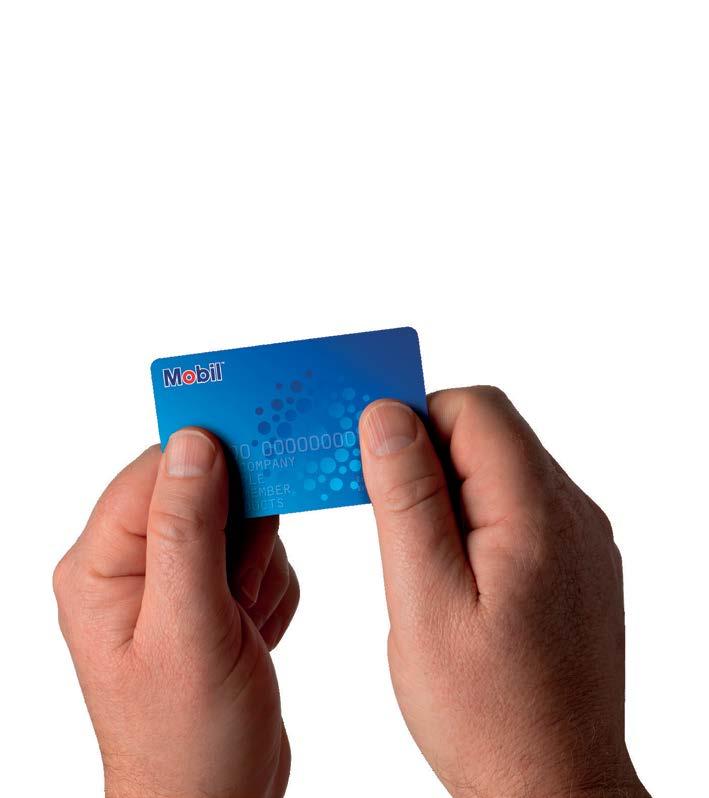
REINZ members who use their Mobilcard at participating stations will receive 11 cents off the pump price.
Standard Mobilcard T&Cs apply.
Commercial property management is a highly specialised area and can lead to a multitude of opportunities and growth. For those looking at entering commercial property management, here's a top-four overview to get you ready to take the next step.

1. Role and responsibilities
As a commercial property manager, you carry out day-to-day management and operational functions of assigned properties. Responsibilities include anything from financial aspects of the property to communicating directly with tenants on behalf of the property owner, conducting inspections and organising insurance and repairs.
2. Residential versus commercial property management
A common misconception is that the role of a residential property manager is much the same as a commercial property manager. For anyone looking to move from one to the other, a commercial role requires a more strategic focus — working with complex and large properties, often involving more legalities.
For instance, residential property management is governed mainly by the Residential Tenancies Act 1986 (RTA), the Building Act 2004, The Building Code, Housing Improvements Regulations 1947, and the Residential Tenancies (Healthy Home Standards) Regulations 2019. Commercial property management is governed by the Property Law Act 2007, and commercial property leases are based on a Deed of Lease. Often, lawyers are involved when an owner and tenant enter into an agreement. Commercial tenancies also tend to be longer in duration than residential tenancies.
3. Property use
Commercial property tenants are businesses or people conducting business within them. Building tenants range from retail, office spaces, shopping centres
and industrial services. As a commercial property manager, you will need to understand the property space functions and its surroundings to manage the property and the tenants successfully, and effectively liaise with its owner.
4. The makings of a great commercial property manager
You are the professional connection between tenants and property owners. You represent the owner but have duty of care to the tenant.
Being aware of this connection and how to balance supporting owners and their assets and the needs of a tenant is vital to being a great commercial property manager.
Ready for next steps?
So, now you have a basic understanding of what it takes to get started in the commercial property management sector, but what’s the next step?
REINZ is now offering a new course — the Beginner’s Guide to Property Management
This course is a great opportunity to get a taste of working and managing properties in the commercial sector.
The course is ideal for branch managers inducting new staff, agents wanting to expand their knowledge and understanding of commercial property management, or anyone who wants to start a new career. The best part is no prior experience is needed. The four-hour induction course will ensure you feel confident and empowered about the basics of the job.
If you’d like to learn more about this course, email education@reinz.co.nz.
The real estate industry can be stressful by nature — the measure of success is clearly defined, and the market can turn at any time. It's a busy job with little 'down' time. Add a pandemic to the mix, and it's fair to assume real estate and property management professionals may feel a little, or a lot, overwhelmed from time to time.
Discussions with our members, including business owners, agents and property managers, have identified stress issues and a lack of mental health resilience. The busy nature of these roles means it could very well be down to many of you feeling you don't have the time, resources, or energy to prioritise your own or your teams' mental wellbeing.

We must make time for each other and be aware of the signs of someone struggling — whether that's colleagues, family and/or friends. Managers need to tune into their team's wellbeing — noticing signs and being proactive if a staff member seems overly tired, quiet, withdrawn, or anxious. Real estate and property management professionals who feel pressure to be constantly available may neglect important components of their life such as eating, sleeping, exercising or simply taking time out.
Let's talk about mental health
REINZ took part in a mental health workshop GoodYarn — designed to deliver practical mental health and wellbeing resources specifically for the workplace. The first step in addressing mental health is talking about it — that's precisely why we trialled the workshop ourselves. Now we want to bring it and the benefits to the profession.
REINZ is excited to roll out this face-toface programme to our wider community, ensuring you can recognise your mental health or that of others around you.
GoodYarn is an evidence-based, peer-delivered mental health literacy programme. It has three key aims and evaluation indicators:
▪ Increase awareness of signs and symptoms of common mental illnesses
▪ Build confidence in starting a conversation where you are concerned
▪ Improve knowledge of where and how to get help.
The GoodYarn programme is our latest non-verifiable learning tool in our toolbox, available to brands and designed for faceto-face peer groups.
Join us and the mental health movement to normalise talking about mental health and checking in on one another. You never know who might need it.
Get in touch with our education team at education@reinz.co.nz if you think this would be beneficial for your team (spoiler alert: it will be!).


While the rise of technology helps drive a level of competitive advantage in the real estate profession, it has also become a challenge to keep up with the Joneses. Now, it involves a bit of a juggling act to satisfy traditional real estate methods and integrate PropTech for the increasingly digitallysavvy demographic entering the market.
The arrival of PropTech has seen thousands of new companies provide the industry with a plethora of choices — and this choice is flowing through to a profession that, for more than half a century, operated in traditional ways.
Technology has a habit of changing and improving rapidly, and ensuring a brand or agency stays current and relevant is often more of a challenge for incumbents than for those entering the digital market for the first time. In this case, being late to the party may pay off for some. Observing the overall trend of where customer appetite sits is as key as determining which areas of your business should be digitised.
A new age — a new demographic
Many real estate businesses are paying attention to the rise of technology in the arms of their future vendors and buyers. They are looking to enhance their offerings for mature, seasoned customers and to attract and retain a key demographic — Millennials and Gen Z.
This digitally savvy group are now generally looking to rent or purchase a first home — or have just reached home ownership. Agencies and brands have an opportunity to connect in non-traditional and innovative ways that may challenge their thinking and their business models.
We know digitisation enhances transparency, which has become increasingly important, particularly with the younger generation. Engagement with a real estate process now often starts with a digital connection and leveraging that relationship can be enhanced through connected services that continue that digital engagement.
Here are some examples of transparency and digitisation that are becoming more widely used throughout real estate:
▪ Digital signing of purchase agreements
Miles Fordyce, Chief Digital & Innovation Officer, REINZ
▪ Virtual viewing and tours
▪ Online AML verification using biometric and document recognition
▪ Online rate my agent
▪ Digital documentation
▪ Blockchain enabled smart contracts (see page 40 for more)
▪ Transparent bid management
▪ Digital bookings, appointments, rate comparisons, league tables
▪ Smart social media listings to engage with, connect and present properties.
Agencies will need to decide the extent they overlay a more traditional approach to real estate for those who want it and a digital experience for the younger generation. A multimodal and multichannel experience for agency customers will likely present several challenges for those looking to operate on both ends of the spectrum. This is due to brand positioning within the market and how a brand may want to be perceived by its customers, along with creating multiple entry points for contact, communication, and engagement with customers — all of which must flow back and integrate with lead management and CRM systems.
The creation of products and services that target a technically savvy generation will provide an advantage over those that fail to recognise the shift already underway.
PropTech is geared to create new offerings and more socially engaging ways people can interact and connect with the profession. The recently launched Australian real estate app 1060 offers a TikTok take on home inspections. It targets the younger
generation in a way they are used to operating — swiping through short, catchy clips and making it more enjoyable. It gives sellers a free way to create and upload content efficiently and gives buyers a quick and effective search option that allows them to connect directly with an agent.
The evolution of PropTech is enabling a combination of synchronous and asynchronous interactions with younger generations who have high digital expectations to engage across a variety of platforms and timeframes.
These platforms might include real-time messaging platforms, digital approval, rapid viewing and assessment of virtual properties, meetings and appointments, or payments.
It doesn’t just stop there. Digital trust is also crucial to this demographic, who
are accustomed to actively reviewing, assessing, and providing feedback on their experience. This can be seen in the growing popularity overseas of digital multisided platforms (MSPs) — technologies, products or services that create value by enabling direct interactions between two or more customer or participant groups.
MSPs can simplify the delivery and aggregation of real estate services such as viewing listings, comparing rates, scheduling and booking appointments, and making payments. All this, without the biases, information asymmetry, and additional costs associated with middlemen. These platforms are creating an end-to-end, experience-driven ecosystem by taking care of requirements such as packing and moving, and utility connections without being associated with an agency or particular brand. For instance, Movinghub, a global PropTech platform providing people with a convenient way to organise moving
home online. It’s a free service that many New Zealand real estate agencies integrate into their software.
The result? An additional streamlined service for clients who purchase or rent a property with the agency. It’s a prime example of a service aggregator with social media rating capabilities.
The profession currently stands at an inflexion point as it re-evaluates its past practices and adapts to the needs and preferences of a more digitally enabled consumer demographic.

Considering the existing and emerging trends, the convergence of digitisation and PropTech innovations will continue to shape the New Zealand real estate profession for the foreseeable future. Having said this, it will still require a bimodal approach to meet the needs of the emerging and traditional customer segment groups.
Digitisation is megatrend 2 in REINZ’s Megatrends report. This article also touches on generational expectations — megatrend 9. This megatrend states the profession should harness technology to ensure increased transparency to improve trust. Based on substantial research, the report also shows how digitisation will impact the New Zealand real estate profession:
▪ Agents will need to stay abreast of PropTech advances and plan for what will be automated
▪ Agents with high emotional intelligence, problem-solving skills, and the ability to form strong relationships will continue to be in high demand — the future of real estate remains distinctly human despite technological advances
▪ Blockchain and other technology will enable enhanced transparency and should be embraced by the sector to provide greater transparency to build trust. This will be particularly important for younger generations.
The creation of products and services that target a technically savvy generation will gain an advantage over those that fail to recognise the shift already underway.
Diversity, aptly, comes in many forms. With more than 200 different ethnicities in our communities, New Zealand is incredibly — and increasingly — culturally diverse. Around a quarter of all people who call New Zealand home were born overseas1. Disability Pride Aotearoa estimates that 14% of New Zealanders have a physical impairment that limits their everyday activities, and with the population trending older, that proportion may increase. Our rainbow communities are also growing, with around one in 20 adult New Zealanders identifying as LGBT+2
For REA, as a regulator, we want to extend our consumer protection to where diversity may increase vulnerability. For licensees, removing barriers to participation by diverse communities in real estate transactions can reduce risks of harm, raise trust and confidence — and generate opportunities in the market.

Well-informed buyers and sellers are empowered to make better decisions. This principle underpins REA’s approach to consumer protection. In any market, information is critical, but even objective, factual information may not be of equal value to everyone. The width of a hallway may be low-value information — unless you’re a wheelchair user. The presence of ashes at an open home may seem irrelevant — unless it presents a cultural barrier to you. And a comprehensive guide to the real estate transaction process won’t help you much if it’s in a language you can’t understand.
Our consumer research3 suggests that people from Pacific Island and Asian backgrounds are less likely to feel
empowered and able to participate effectively in a real estate transaction. Migrant consumers are more likely to experience an issue when buying or selling. Those who have English as a second or third language may be particularly vulnerable. Information must be both accessible and relevant to its intended audience to become useful knowledge. At REA, we believe that to empower confident real estate consumers across New Zealand’s diverse communities there are knowledge gaps to be closed — and we want to work with the industry to close them.
REA has taken steps to broaden the accessibility of a key consumer resource: the approved guides to the residential agency agreement and residential sale and purchase agreement, as well as our real estate buying journey guide. As licensees will know, REA requires you to provide a copy of the relevant approved agreement guide to a client or consumer before they sign either of those two foundational contracts. Effective from 14 October 2022, there are new approved English versions
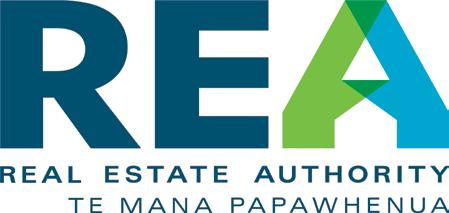
of these guides4 and these have been translated into six languages: Samoan, Tongan, Korean, Simplified Chinese, Hindi and Te Reo Māori.
These are languages the industry has told us you commonly encounter (and use) while doing business. The Te Reo Māori translation is symbolic and practical, signalling REA’s commitment to Te Tiriti o Waitangi (the Treaty) and the importance of engagement with Māori as tangata whenua.
Alongside our internal capability development, REA is committed to supporting the sector to understand and address the distinctive needs of consumers from all diverse communities. From 2023, we are initiating a mandatory Diversity and Inclusion series within the Continuing Professional Development (CPD) programme. The first module is an introduction to Te Tiriti O Waitangi in the context of real estate. The purpose of the module is to enable a core understanding, particularly given the unique historical
context of land ownership in New Zealand. It also provides a foundation for a broader diversity and inclusion series to be delivered in subsequent years.
We appreciate that licensees will have differing levels of understanding of Te Tiriti. While some will be very familiar, in our recent licensee survey, the average self-rating in terms of your knowledge of Te Tiriti, tikanga and its connection with real estate was just 44%. REA wants to support the sector to lift its overall cultural competency, empowering licensees to engage with our diverse communities confidently, building relationships, cultivating trust and preventing harm.
Licensees often see REA as a disciplinarian first, responding to conduct harms, but as a consumer protection agency our work to prevent harm is equally important.

We took a major strategic step in this direction in 2018 with the launch of our consumer information website
Settled.govt.nz, which is a powerful tool for preventing harm through empowering residential consumers with information. The next step requires a recognition that knowledge and understanding are most empowering when it addresses vulnerability, where the risks of harm are greatest.
In terms of New Zealand’s diverse communities, we aim to close our own knowledge gaps, those of our consumers, and our licensees. We are at the early stages of this journey, and we hope that REINZ members will walk with us and embrace the opportunities this greater knowledge and understanding will unlock.
A wheelchair-using consumer recently addressed REA about her experiences buying a home. She identified gaps in the information provided in marketing about a home’s accessibility, resulting in wasted visits to open homes. She also spoke about being overlooked by salespeople in favour of her non-disabled partner. We are aware of similar negative experiences from consumers in the rainbow community and from a range of cultural backgrounds. What can you do to break the bias and remove information and attitude obstacles for consumers in the real estate sector?
It's hard to know when you're at the market's peak… until it's over. Diego Traglia, Lead Agent from Harcourts Northwest Realty, gives us no-nonsense advice on achieving the best results no matter the market cycle.

There is no denying this is a tough market to operate in. In many ways, it reminds me of the market we experienced back in 2017 when I was fresh in the profession. It's a market where you can create a market share. It's a market that, if you survive it, you will excel once it picks up again — and it will. It always does.
Here's what I've learnt over the years to remain at the top of my game and prospect for the future.
Go for the low-hanging fruit
Expired and expiring listings — these were the most important source of listings when I entered real estate. To this day, it is still a lucrative strategy for my income.
Let's face it, it is only when the tide goes out that you can learn who has been swimming naked. Many agents don't know how to navigate this market. Therefore, they are not selling their listings because they rely only on open homes or are not getting their vendors to invest in property marketing. Service is the new marketing; salespeople need to go back to their roots to partake in more traditional methods of consultation with clients.
Get yourself in front of those vendors — most of them want to sell, they just need the right advice. I've been telling vendors to be courageous and meet the market. The biggest mistake I see vendors making is rejecting offers in the first month and then regretting they didn't accept the first offer.
If you have the advantage of being in the profession for a while and find yourself quiet, go back to previous clients you have sold to and offer price updates on their property. Buyers backed by equity have a significant opportunity in this market — with high levels of stock offering greater choice, it is an ideal time to upsize and is something they may not have considered.
My team and I always look at ways to connect with and better our community — whether cleaning up a beach or fundraising for charity. As real estate agents with in-depth local knowledge, we are in a special position to be able to build a better community. A successful salesperson not only engages with clients but places themselves as an engaged member of the local area. It's a great way to boost team morale, meet new people, and grow your influence and brand locally.
Trust is important now more than ever in this current market. Your clients need to feel that you have their best interests at heart. Vendors need reassurance, and the best way to do this is through trust. Be honest about the market and the possible value of their property. Show them how you can help — explain your systems, processes and what you'll do behind the scenes to ensure they'll achieve the best outcome possible.

It is crucial you have a genuine understanding of the market and its current cycle. You need to know what's selling, the average amount of days properties are spending on the market, how many people are turning up at open homes, what properties are attracting the most attention and why. Be a market leader, and be sure to reflect this in your client relationships to foster trust.
Buyers need help to feel confident in making decisions — you must provide a level of service that will emotionally help through a
significant purchase. In our current market, salespeople need to bend over backwards for both buyers and vendors to ensure a foundation of trust is built.
As if all of this wasn't enough — you need to think about how to prospect for future business. How will the next vendor find you?
Many vendors begin their research on real estate salespeople months before calling.
Be present on social media, offer free reports, free digital appraisals, and free advice. Don't ask for business until you have earned the right to ask.
Whilst sales jargon traditionally tells us Always Be Closing (ABC), I tend to disagree. My motto is to Never Be Closing — always give until clients have no option but to come to you for advice. This way, you prove yourself as a market leader. Think of yourself as an agent your clients need on their shopping lists.
As more and more Kiwis make the shift to a sustainable approach to living, Climate Leaders Coalition Signatory, the New Zealand Green Building Council (NZGBC), and the Sustainable Business Council (SBC) reflect on the difference sustainable homes can make to the quality of life, energy and emissions, and a home's value.
Mike Burrell, Executive Director, Sustainable Building CouncilDespite Kiwis facing the ongoing challenges and uncertainty of a global pandemic, our commitment to sustainability is only continuing to grow. The recent 2022 Kantar Better Futures report found even in this challenging context, New Zealanders' personal commitment to living sustainably continues to track upwards, with 43% of Kiwis committed to living a sustainable lifestyle.
It's a trend that extends to real estate, as more Kiwis seek sustainable housing options.
"Housing is absolutely central to our quality of life," says Mike Burrell, Executive Director at Sustainable Business Council (SBC).
"Poor performing homes that are cold, damp or difficult to heat, contribute to the health issues of those who live in them whilst also having a significant impact on our energy consumption and emissions."
NZGBC Chief Executive Andrew Eagles agrees.

"If we want to improve the health of New Zealanders in Aotearoa, reduce the cost of living for whanau, drastically improve power grid resilience, and lower our carbon emissions — it all starts at home."
A typical new Kiwi home emits five times too much carbon to stay within two degrees of warming. That's the homes being built right now, and to the less ambitious two degrees target. Part of that is the construction pollution and materials, but also poor performance brought about by low insulation standards and inefficient systems.
"People often associated sustainable homes with flash solar arrays on the roof, but the reality is it's much better to ensure your home stays warm and dry and actually uses electricity efficiently first," Andrew says.
Five years ago, the number of new homes built to the Green Building Council's Homestar system, which rates the health, efficiency, and sustainability of homes, was between 400 and 500 per year.
In the last financial year, that number was closer to 6,000 homes thanks to the likes of Bupa, Fletcher Living, Kāinga Ora and others building to Homestar on their developments.
"With 49,000 consents issued last year, it also equates to over 12% of the new homes being built, a trend we are certainly only expecting to continue to grow over the next few years," says Andrew.

"2022 is a critical year for climate in New Zealand, with the delivery of our first Emissions Reduction Plan and National Adaptation Plan aiming to reduce our emissions as well as build the country's resilience to a warming world," Mike adds. "Against this backdrop, we'd expect this trend of personal commitment to sustainability to continue to grow as the nation moves collective ambition into real action in order to build a sustainable future for all New Zealanders," Mike concludes.
So, with the focus on sustainable homes only looking to increase, what can people do to make their existing home more sustainable and healthier? And, in turn, more attractive to potential buyers?
The easiest way of checking the state of your home is to use the free online HomeFit check. Developed to help assess the health, comfort and energy efficiency of New Zealand homes, this simple online check will tell you what can be improved and put you in touch with installers to help get any work done. For those with rentals, it will also help
check whether you meet the Healthy Home Standards required for tenants.
A few easy DIY improvements to make are:
▪ Checking insulation
Aim for a minimum of 140mm of insulation in the ceiling and check there is adequate cover. Insulation put in some time ago may have been moved for lights or other items. Check the insulation adequately covers the entire ceiling. Also check underfloor insulation is adequate — see HomeFit for guidance.
▪ Ventilate
Getting the moisture out of a home is vital.
▪ Stop those draughts
Even if insulated well, draughts can really cool a house down. Caulking and new seals are easy to get for leaky windows. Door draughts can be stopped with a door sweep.
HomeFit has good guidance on how to check for all draughts throughout the house.
▪ Invest in energy efficient light bulbs
Swapping out those old incandescent bulbs with LEDs will use less energy; plus, they won’t need to be replaced for years.
▪ Insulate water heaters
Wrap water heaters in a heat blanket to massively reduce heat loss and save on electricity.
▪ Buy for efficiency
Look for energy efficiency ratings when buying appliances, heaters or replacing any home water/electrical systems. Gen Less has a handy energy efficiency calculator online.
▪ Look for insulating curtains or honeycomb blinds
Honeycomb blinds and thick curtains (fit
appropriately) can help insulate windows and keep cold out and warmth in.
▪ Consider rainwater harvesting
There are some fantastic, affordable systems to capture a property’s rainwater for use in the garden or even in a home, saving on water bills and easing pressure on local water supplies.
▪ Save water with an aerating, waterefficient shower head
Saving water is a big one. There are great options available in New Zealand for attractive, water-efficient shower heads which reduce water use.
There are so many ways we can improve our homes to make them warmer, healthier, drier, and better for the environment. The key is to take stock, keep sustainability in mind, and make whatever improvements possible.

If we want to improve the health of New Zealanders, reduce the cost of living for whānau, drastically improve power grid resilience, and lower our carbon emissions — it all starts at home.
Climate and sustainability are megatrends 6 and 7 in REINZ’s Megatrends report. The report suggests the real estate profession should consider its role in the future of supporting vendors planning to sell on sustainability improvements to attract more buyers and a premium. To learn more about the sustainability megatrend, head to the report section of www.blog.reinz.co.nz/reports-1/megatrends-report-2022.
As our population grows, traffic, lack of clean water, energy consumption and residential safety will worsen as they strain city infrastructures and services. What can we do to help build a prosperous tomorrow? We explore several smart cities across the globe leading by revolutionary example, and what we can expect to see in Aotearoa in the coming decades.
There is an increasing trend in implementing smart sensing technology — utilising it more efficiently and effectively to gather data and increase the quality of services. Major cities are being converted to smart cities by adopting innovative smart technologies into their infrastructures to make their residents’ everyday lives better, more efficient, and eco-friendly.
An important characteristic of a smart city is the ability to adopt technological advances and develop innovative ways to address and promote practices that resolve urbanisation challenges. A smart city must have a system that can collect, produce,
Jan Rivera, Communications & Marketing Assistant, REINZ
and display real-time data and trends so that the decision-makers have access to the most up-to-date and reliable information. Cities worldwide have recognised the benefits of smart-sensing technologies for measuring a city’s social and economic health in real time.
Singapore has a reputation for being ahead of the curve when it comes to technology. Since launching its Smart Nation program in 2014, Singapore has introduced and integrated a variety of smart technologies into its society, including:

▪ Installation of sensors around the city to pick up real-time information or patterns of activity around the city
▪ Implementation of contactless payment technology; widely adopted by its citizens
▪ Introduction of a digital health system that normalises video consultations as well as wearable devices to monitor patients and assist the ageing population. In 2021, Singapore announced its plans to convert Tengah from an agricultural town into a new eco-smart city that is entirely vehicle-free with safe zones for pedestrians and cyclists. The 700-hectare town will be home to five residential districts with 42,000 smart-enabled houses with unique characteristics, including centralised cooling systems, automated waste collection systems and a range of smart features.
In 2021, Dubai became the world’s first government to go 100% paperless. Around 90% of their government services are now digitised and accessible through the DubaiNow app. The city has autonomous police stations where citizens can go to pay fines or report incidents without talking to a person.
Dubai has hundreds of smart initiatives resolving transport, communications,
infrastructure, electricity, economic services, and other urban challenges currently in place or being implemented today.
Oslo is working towards its goal of cutting 95% of its carbon emissions by 2030. They are the first to integrate hundreds of thousands of smart street lighting and sensor radars throughout the city. These lights are programmed to be on 20% intensity when in energy-saving mode and automatically adjust the intensity to 100% once it detects movements from cars, bicycles, and pedestrians. Oslo plans to progress further by reconstructing its transportation network to be a car-free city.
So, when will these initiatives hit our own shore? It’s already happening — and more so than you may think.
Last year, New Zealand became the first country to have all local council’s join the Smart Cities Council, with the aim to use technology and data to enhance liveability, workability, sustainability, and urban resilience. Not only this, but in August 2022, the Ministry of Education announced New Zealand’s First National Adaptation Plan. The plan highlights Government actions over the next six years — aligning
their strategies with resilience and lowemissions objectives. With initiatives already in place, housing developments that are sustainable and eco-friendly will be supported and incentivised.
In Christchurch, local governments are starting to delve into new technology and approaches that will make the city a smarter, safer place in which to live, work and play. There is now a Christchurchspecific web app called SmartView available to residents and visitors. The app gives users access to a range of real-time information, including:
▪ Where to find mountain bike tracks
▪ Number of spaces available in car park buildings
▪ Where the nearest bus stop and the time of the next arrival
▪ Air quality
▪ Weather updates
▪ Updates on events happening throughout the city.
These are the beginning of smart city implementations being introduced across the globe that consider environmental and human factors, such as population rise. Whilst we’re not travelling via hovercraft just yet — the smart city approach allows us to create space for a growing population and enables a better quality of life without further harming our environment. It’s a sustainable initiative with people at the core.

This article reflects the sustainability and urbanisation megatrends featured in our Megatrends report. Continued growth in cities needs a diversity of housing options to enable people to stay in the one region and open up stock. Beyond residential and commercial property is a trend towards enhanced green space — especially around higherdensity town planning. Likewise, a focus on precinct circular economies and zero waste programs will provide opportunities and challenges to traditional planning approaches.
To learn more about these megatrends, head to the report section of www.blog.reinz.co.nz/ reports-1/megatrends-report-2022.

As a real estate agent, you’ll know all about the hidden and not-so-hidden costs of selling a home. But vendors often underestimate the impact of these costs on their sale.
Now that the market has turned and margins are reducing, it’s all the more important to ensure that your vendors get the most bang for their buck. We put together some helpful information you can share with your clients on the costs involved — and how we can help to cover some of those.
With more and more listings coming to market, and reportedly fewer buyers shopping around, competition among vendors is gaining steam. That’s where a premium marketing campaign can help them stand out from the crowd.
Depending on your vendor’s requirements, the package can include anything from professional photos to videos and virtual walk-throughs. Of course, a targeted marketing plan featuring professional photos comes at a price, but it’s also an investment in visibility.
According to Wise Up NZ, professional real estate photography packages can cost between $200 and $1,200, depending on how sophisticated the service is. Some photographers, for example, may use drones for aerial stills and videos to give potential buyers an even more immersive experience.
Professional home staging is all about highlighting the best features of the property. Home stagers know what makes buyers tick, and how to draw their attention to all the right places.
Home staging fees are based on the stager’s experience, as well as the property size and period length. So, it’s not easy to provide a ballpark figure. But generally, a vendor can expect to pay between $1,000 to $5,000 (and more) for a five-week period.
It’s important to stress to your vendors that penny-pinching may not be a good idea. Low-cost packages may use lowerquality furniture that’s not aligned with the property’s look and feel — with the risk of obtaining the opposite result.
Lastly, a quick note about storage costs: if your vendors need to declutter or remove some items, they may also need to factor in those requirements.
From little fixes through to more comprehensive remedial work, properties often need a final spruce-up before being put up for sale.
As the real estate agent, you will be there to help to guide on what fixes are likely to boost the property’s value. It could be something as little as a fresh coat of paint or removing scratches and dents. Or it could be repairing something that, as it is now, may get in the way of a profitable sale. Fixing around the house is more than just a nice-to-have. Often, sale and purchase agreements are conditional to building reports. And if the builder’s inspection identifies hidden issues, these may need to be fixed before the agreed settlement date.
Some buyers may add a professional cleaning condition to the sales and purchase agreement. But even if they don’t, ensuring the property is spotless, clutter-free and welcoming is all part of making it sales-ready. Again, costs vary widely depending on the company, so it’s a good idea to recommend to your vendors that they request quotes, read plenty of reviews, and if possible, ask family or friends who they would recommend.

Finally, let’s talk about lawyers and conveyancer fees. With so many binding documents to make sense of, it’s a good idea for vendors to get professional legal assistance, to navigate the intricacies of the sales process with confidence. Based on the complexity of the transaction and their budget, costs can vary widely — but the potential costs of not getting advice can be a lot higher.
Disclaimer: Please note that the content provided in this article is intended
and reliability, the information provided is subject to continuous change
decisions based on the information provided in this article, please use your discretion,
At List Now (formerly known as Lifestyle Finance) our mission is to help Kiwi vendors make the most of their property opportunities, thanks to our smart finance tools. We can fund the marketing of a home, and your vendors will not have to make any repayments for the first six months. Plus, if the property needs a revamp ahead of going on sale, we can help with that too. Vendors pay nothing upfront and make no payments for six months or until the house is settled, whichever comes first.
To learn more about our finance solutions head to www.listnow.co.nz.
It’s important to stress to your vendors that penny-pinching may not be a good idea.
One of the biggest financial mistakes we see people make is not preparing financially for their future, which can take many forms. From not quite saving enough to cover the expenses of a holiday to not preparing sufficiently for retirement and running out of money well before running out of life.
We see this play out in other ways, namely, not preparing for an economic downturn when times are good. This can be made worse if you’re on an inconsistent income when the money in your bank account reflects a thriving market.
When the earnings are good and interest rates are low, people often overextend themselves financially. They’ll buy houses that are too expensive or add to their shortterm debt, confident they can pay it off. However, when the economy turns, inflation goes up, as do interest rates, and debt repayment becomes more difficult as cash flow tightens. If you’re on a salary, you may be able to scrape by — drawing the purse strings and cutting down on discretionary spending.
But, if your income is commission-based only and you see sales drop, things could get a little hairy if you’re not prepared financially.
Hannah McQueen, strategic coach, Director, and Founder of enable.me hosts a workshop at REINZ’s NZRE conference where she shares what’s required to be financially prepared for economic headwinds when you’re on an inconsistent income.

Hannah shares key strategies on how to become financially resilient. Resilience refers to the ability to withstand adversity and bounce back from difficult life events. So, when it comes to our finances, resilience refers to being able to withstand an
economic downturn or loss of income for a prolonged period.
But Kiwis are not great when it comes to financial resilience. According to the Financial Services Council New Zealand, most employed New Zealanders have less than six months’ worth of expenses saved. So, what can you do to build your financial resilience?
As above, your buffer should be about six months’ worth of expenses to get you through times when you may not be earning money. This buffer will help prevent you from going into debt and tracking backwards. It doesn’t necessarily need to sit in a savings account. It just needs to be accessible at short notice.
When times are good, you need to be disciplined so you don’t overspend but rather put money away for those times when income is a little tight.
For those who may have some trouble with this, you could try a zero-sum budget. With this method, every single dollar of your income is allocated — including money that’s allocated to saving and paying off debt.
For this to work, you need to know your baseline expenses, how much spending money you’ll allow yourself, and how much you’ll put towards investments or savings.
For those months that you earn more than this base, you can use that extra money to build your buffer or pay off any debt more aggressively to alleviate the pressure during those months your income isn’t quite as high.
Are you a shopper or a saver? It is important to get a deeper understanding of why you spend your money the way you do. Once you understand those tendencies, you can use them to your advantage.
If you’re a spender, for example, could you redirect money from buying a new suit or shoes to paying down your mortgage faster? If you’re a saver, could the money in the bank be redirected into an investment that will give you greater returns (and ensure your money doesn’t get devalued through inflation).
Of course, doing this all on your own can feel daunting. This is where a financial coach comes in handy. They can help you determine where you’re at now and what your capabilities are to set up a plan to help you build your financial resilience, grow your wealth, and help you weather any headwinds.
To dive deeper into how you can best manage your money when you’re on commission only, book a consultation with an enable.me coach today at enable.me/book-a-consultation.

It’s important to stress to your vendors that penny-pinching may not be a good idea.
On 30 June 2022, the Ministry of Justice presented a report to the Minister of Justice on how the Anti-Money Laundering and Countering Financing of Terrorism (AML/CFT) Act has performed since 2017, making recommendations for changes to the Act and/or regulations. Melisa Beight discusses the potential ramifications for real estate professionals of a proposed sweeping change to the AML/CFT regime.

We have all been concerned by the prospect of a sweeping change to the AML/CFT regime. Not only because of its requirement of licensees to not only complete customer due diligence on their vendor client (unless they are a buyer’s agent) but also/instead be required to do due diligence on purchasers/prospective purchasers. The implications for the real estate profession would be immense.
REINZ and members strongly opposed this proposal for a multitude of reasons:
▪ Ordinarily a real estate agent does not have a business/contractual relationship with the purchaser
▪ A real estate agent is expressly prohibited from having a business/contractual relationship with both parties in the same transaction; it would contravene an agent’s legal obligations
▪ It would be unduly onerous, impractical and in some cases impossible for real estate agents to complete due diligence on prospective purchasers
▪ It would create further impediments to an already time-poor profession
▪ There would be a doubling or tripling of financial costs depending on what stage in a transaction a real estate agent would be conducting customer due diligence on the purchaser, for very little gain given others do due diligence on purchasers, including their banks and lawyers
▪ These other professionals (banks and lawyers) are better placed than real estate professionals to detect red flags.
REINZ filed detailed submissions opposing a change to the status quo and facilitated
two extensive feedback rounds, enabling members to explain their concerns to the Government regulators directly. Below are some of the likely repercussions if the radical change proposed were adopted:
▪ The introduction of additional AML obligations in relation to non-client purchasers in certain circumstances would likely become a de facto requirement for real estate professionals to complete due diligence on all purchasers. Other than a suitcase full of cash or overpayment of the deposit, what else is likely to raise red flags to a real estate professional who has no prior knowledge of, or contractual relationship with, a prospective purchaser?
▪ It would significantly change the New Zealand property market. Purchasers could decide not to satisfy AML to get out of an otherwise unconditional sale. It would create uncertainty and delays in every sale. It would likely undermine how we transact real estate in New Zealand.
While we have received a reasonable degree of comfort (verbally) that there will be no unwanted surprises for the real estate sector, we aren’t able to let out that collective sigh of relief just yet — not until the long-awaited report is released.
We hope the recommendation for the real estate sector will be to take a closer look at where the risk lies and how that risk can be mitigated before recommending any farreaching changes. Because at this point, we haven’t seen hard evidence that anything within real estate professionals’ sphere of control needs changing.
As always, we will keep you updated on any further progress.

From our innovative marketing tools and worldclass systems, to our industry leading training and development programmes, we are dedicated to providing our salespeople with every opportunity for growth and success.
Our vast network of offices spans across several bay side coastal locations such as Mount Maunganui,
0800 743 837
Papamoa and Whangarei. Giving you the opportunity to pursue a professional career with a leading real estate company, whilst having the beach on your doorstep. With a culture of rewarding and celebrating your success, when joining the EVES family will arm you with the skills, support, and expertise to maximise your earning potential.
We are recruiting for experienced, successful salespeople to join our team now.
AML Compliance Officer Jade Dolman takes us through how Harcourts Team Group successfully built AML into their business-as-usual.
When AML/CFT was expanded in 2019 to include real estate, Harcourts Team Group was faced with the challenge of adjusting its sales process to include compliance with AML obligations. Selling hundreds of commercial and residential properties a year, and with a solid reputation in the real estate market, Harcourts Team Group could be a prime target for money launderers. Putting strong AML/CFT processes in place — including staff training, record-keeping, and document management — was vital in achieving AML compliance.
AML Compliance Officer Jade Dolman has been at the forefront of managing the Group’s AML compliance since late 2019. Tasked with aligning three sets of internal stakeholders with AML, Jade took a strategic approach to creating a culture of compliance through training, support from Harcourts Team Group Directors, and the latest technology.
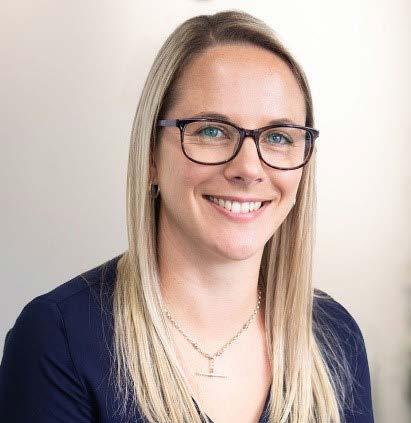
Train, understand, repeat
The successful incorporation of AML into Harcourts Team Group’s everyday workflow was supported by robust and ongoing training and education, to help the team understand the importance of AML policies, procedures, and controls.
“Every real estate salesperson gets one-toone training with me on AML. We go over the basics and a few months later have a refresher catch-up... doing so helps them understand what their AML responsibilities are, and that it’s not as difficult as they might think, especially with the resources I provide. It also enforces the rules around AML, Harcourts Team Group is a trusted brand and so we need to be doing things right,” says Jade.
Having the support of the company Directors was vital to Jade in creating a strong culture of AML compliance.

“As a Compliance Officer, it’s great to have management take what I say very seriously, especially as sometimes you must ask people for more information or deal with someone who is not happy giving it to you.
“While I am supported by our Directors, I make sure that, in turn, I’m giving support to agents and staff. They can contact me at any time and know that I will always answer. And I always say to them that spending a bit more time with me to get the right answer is important — no one wants to take the wrong answer to their client. So, making sure the team feels supported and has the right tools is essential,” adds Jade.
The use of technology has helped Harcourts Team Group smooth the transition into an AML/CFT regime and

Five red flags real estate professionals should watch out for:
1. Property value is under or over-priced
2. Large amounts of cash are used
3. Client has access to funds that don’t match their business or personal profile
4. Client is located in a foreign country, especially one known for a weak AML regime
5. Payments are received from an unknown third party.
embed their new approach to managing AML through the transaction process by giving agents the flexibility to upload documents in the field, from anywhere in New Zealand.

“Using specialised AML technology (AMLHUB), agents can collect documents by using their phones rather than having to bring it all back to the office to scan. It makes everyone’s life easier. And because this tech is hosted in the cloud, it also means I can do my job from anywhere, which was especially important during the COVID-19 lockdowns.
“This new process also helps establish clear boundaries and expectations. If it’s [the property transaction] not verified in the software, there will be nothing happening with the property until it is.”
All this hard work by Jade and her team paid off when the business underwent an onsite inspection by the Department of Internal Affairs (DIA) — and passed with flying colours.
“We had a random inspection by the DIA, who came in and looked through everything: our Compliance Programme, all my training material, the suspicions register on the AMLHUB, and they randomly picked some salespeople and managers to interview. They came back to me after that, and they didn’t have any issues with anything.
“I’m thorough with our AML, and I use the AMLHUB, so I didn’t feel like there was anything more I could have done to prepare that was a personal victory for me. I felt so proud that every person they spoke to within our company, and everything they’d looked at, had been satisfactory to them.”
Bringing a large company into alignment with the AML/CFT regime is no small feat. Having conquered the challenges in building out a comprehensive AML programme and workflow for a large real estate agency, Jade has advice for anyone looking to move into the AML/CFT compliance space.
“Be there for the people who rely on you for information. It’s a big responsibility. Check and recheck everything you send out because it’s important to get it right. Build your support network around you, especially senior management, so you’re enabled to do your job. Be diligent about recording the reasoning behind the decisions you make. Be open to advice and guidance because we’re all here for the same reason,” Jade concludes.
Every real estate salesperson gets one-to-one training with me on AML. Doing so helps them understand what their AML responsibilities are, and that it’s not as difficult as they might think.
On December 20, 2021, the Resource Management (Enabling Housing Supply and Other Matters) Amendment Act 2021 was passed into law. From August this year, local councils of rapidly growing cities must apply new Medium Density Residential Standards (MDRS) to enable medium-density housing. It is important for real estate agents to feel confident in providing the right advice on the use of these plans.
Since August 2022, property owners have been able to build up to three dwellings on a single section, three storeys high, without obtaining resource consent.
The ability to build multiple dwellings on a site is now often openly marketed with surveyor plans to entice buyers by illustrating a property’s potential.
The issue is that the copyright in these consent plans belongs to the surveyor. Perhaps even more importantly, the consent plans are prepared for a specific purpose, are subject to various Council conditions, and key features such as boundaries can change significantly until the survey plan is deposited with Land Information New Zealand.
The Coastal Otago Branch of Survey and Spatial New Zealand has noticed — and notified REINZ — of an uptick in real estate agents not disclosing the various conditions associated with consents plans that buyers should be informed of.
Real estate agents are aware of the requirement to not make false or misleading statements or unsubstantiated representations in their advertising material. This means that advertisements should be truthful and not contain any statement or visual presentation — or create an overall impression — which directly or by implication is likely to mislead purchasers.

Often, with the best intentions, real estate agents will publish a preliminary resource consent site plan to attract developers to enquire about the property. However, what these advertisements can fail to mention is that surveyors often draw up resource consent site plans as a part of the initial application process for consent to build on a property.
Council may then impose further conditions and requirements down the track, often requiring a change to the original plans — anything from reducing the size of the development to including additional easements or requiring the building to be set further back from the road. It is easy to see how an unassuming buyer may infer the potential of the site is more advantageous than it really is.
Further, to simplify resource consent plans to make them more digestible for the everyday purchaser, agents may crop out essential elements of a resource consent plan before uploading it on their website. However, a disclaimer on any document should never be removed. A disclaimer exists to protect the author of the site plan. It also protects real estate professionals. Without the disclaimer, the agent may be held liable for misrepresenting the property.
Rule 5.2 of the Real Estate Agents Act (Professional Conduct and Client Care) Rules 2012 states ‘a licensee must have
sound knowledge of the Real Estate Agents Act 2008, regulations, rules issued by the Authority (including these rules), and other legislation relevant to real estate agency work’.
In New Zealand, copyright protection arises automatically once an original work is written down or recorded in some way, as provided under the Copyright Act 1994. A person infringes another’s copyright by reproducing another person’s work for any other purpose than the work was intended for.
Often, clients presume that they own the resource consent plans as they paid for the plans to be produced, but unlike the copyright in professional marketing photos, the copyright ownership in the consent plans remains with the surveyor.

When vendors enter into REINZ’s Residential Real Estate Agency Agreement, they expressly confirm to the agency that they have obtained all necessary authorisations to allow the use and disclosure of information in the marketing process.
However, REINZ and Survey and Spatial New Zealand strongly encourage real estate agents to double-check that their client has indeed obtained all necessary authorisations to use resource consent plans by confirming with the surveyor, as vendors often overlook this.
Therefore, when using a resource consent plan in any advertising material, it is important to ensure the surveyor consents to its use and that there is a clear disclaimer to ensure everyone is protected.
Advertisements should be truthful, and not contain any statement or visual presentation — or create an overall impression — which directly or by implication is likely to mislead purchasers.

The Overseas Investment (Forestry) Amendment Bill has recently been adopted as law with the purpose of requiring overseas investors to meet the more stringent 'benefit to New Zealand' test rather than the previous 'special forestry' test when planning to convert New Zealand land to forest.

Where an overseas investor is buying more than 1,000 hectares of forestry rights per year, they will need to satisfy at least one of the following three tests (depending on the circumstances) to obtain Overseas Investment Office consent.
The 'benefit to New Zealand' test will be applied to investors wishing to convert land into forest. In considering whether an overseas investor meets the test, the Overseas Investment Office (OIO) will examine whether the investment will, or is likely to:

▪ Result in economic benefits for New Zealand (e.g., the creation or retention of jobs, the introduction of technology or business skills, and increases in productivity)
▪ Result in benefits to New Zealand's natural environment
▪ Result in continued or enhanced access by the public to sensitive features of the land (e.g., if the land contains historic heritage)
▪ Result in continued or enhanced protection of historic heritage (e.g., through the form of a heritage covenant or compliance with existing covenants)
▪ Give effect to, or advance, a significant Government policy
▪ Involve oversight or participation in the investment by locally based New Zealanders.
A higher threshold test applies if the land being converted to forestry includes farmland exceeding five hectares. The investment must provide a higher level of economic benefit and oversight and participation by local New Zealanders to ensure the investment is of a size or nature
that is of substantial benefit to New Zealand.
But the higher threshold test can be avoided if:
▪ The transaction is minor or technical; or
▪ The transaction does not materially change the level of ownership or control that the overseas investor has over the assets; or
▪ The farmland has limited or no productive capacity and will be used promptly as a result of the investment for:
— industrial or commercial development
— the construction of one or more buildings that will together consist of at least 20 residential buildings.
If the higher threshold test is avoided, the general 'benefit to New Zealand' test must still be met.
For an investment in existing forestry land, the 'special forestry' test applies. The test will be met where:
▪ The land will be used exclusively (or nearly exclusively) for forestry activities
▪ The land will not be used for residential purposes (except to provide accommodation for workers); and
▪ Whenever a crop of trees is harvested, a new crop will be replanted.
The Toitū Te Whenua Land Information New Zealand guidelines provide that investors must implement and maintain certain existing protocols relating to logging arrangements, public access and protection of native plants, animals and historic places.
Investors planning to purchase existing forestry land may apply for a standing consent, allowing them to obtain consent without identifying the land they intend to buy. Standing consents are for investors with a proven track record and detailed business plans.
It is important to note that consent will not be required for Australian citizens or entities (in certain circumstances) nor investors buying less than 1,000 hectares of forestry rights per calendar year.
As agents, if you have vendors selling more than 1,000 hectares of forestry rights, you should recommend they take legal advice from a lawyer experienced in the Overseas Investment Act area.
Pixie was a force to be reckoned with and a trailblazer for women in real estate as one of the first female salespeople in New Zealand.

Before finding her passion in real estate, Pixie worked as a secondary school teacher and a PR Assistant in the Prime Minister’s department.
In 1957, she found her true calling. Stepping foot into E.W. Win Real Estate Ltd, Pixie became one of the first female real estate agents in the country. Subsequently, she was the second woman to gain the New Zealand real estate qualification (AREINZ) and the first female president of the Nelson branch of the Real Estate Institute. She was also the first woman elected to the Richmond Borough Council and became a fellow of REINZ (FREINZ) in 1994.
Pixie’s prime interest while on the Council was town planning. She was fundamental in making various changes to the then Richmond Borough Town Plan so that more land in Richmond could be made available for development. Pixie and her husband were also involved in other property projects in Nelson, starting several subdivisions.
Working as one of the only women in real estate was an interesting feat. She changed her name from Pixie to P.P Sanders so clients thought they were coming in to see a man. They would often arrive asking for Mr. Sanders, to which Pixie would diplomatically advise that Mr. Sanders was out, but she would be happy to help. This tactic was instrumental in gaining herself business.
The real estate profession lost a dedicated member on Sunday, 26 June 2022, with the sudden passing of Lois Grigg.
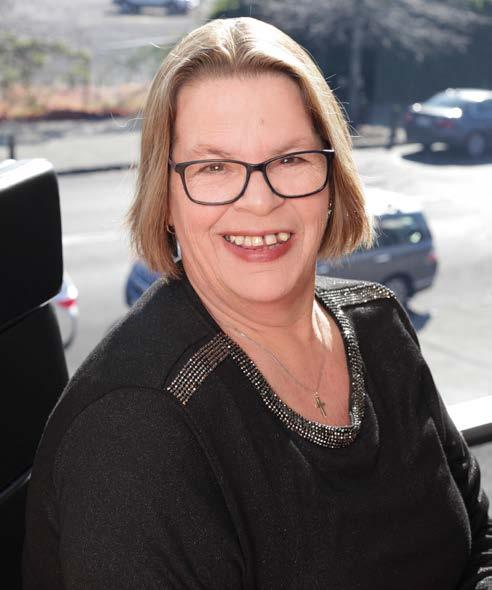
Lois was a loyal and dedicated member of the LJ Hooker and Harveys corporate team for more than a decade — most recently the network’s Franchise Support Administrator. She was known by many throughout the profession having worked for Century 21 for many years before joining LJ Hooker and Harveys. Lois loved to get to know everyone she worked with. The LJ Hooker and Harveys network were a significant part of her life — which she considered her family.
Lois was known as a wealth of knowledge, filled of wisdom and information she gathered during her years. If anyone ever needed to know something about the LJ Hooker and Harveys Group, Lois was sure to know the answer off the top of her head.
Lois leaves behind two daughters, Rebekah and Megan, and her beloved dalmatian Mila.
Pixie’s colleagues remember her as loyal, fair, kind, and aware — but not intrusive. She was modest personally and in business and even years after retiring she remained a mentor in the profession and developed strong friendships.
Whilst Pixie held a fruitful career, she was also a mother to three daughters and a grandmother. Pixie will be forever remembered as a positive and powerful woman, an influential leader, and a wonderful teacher.
Kyle has been a member of the LJ Hooker family since 2013. Working at LJ Hooker Raglan, Kyle shone. He moved up the recognition ladder becoming a top 5% member in his first year and reached the top 2.5% in his third year.
Kyle was also a central part of the Raglan community. He was a backer of the local golf club, waving the LJ Hooker flag at the annual Easter tournament, and would participate in anything near the water. You’d be sure to see him on the LJ Hooker jet ski as part of the water safety team, keeping people safe.
Kyle had a case of the green thumb — there was always something growing in his garden. It was a passion he’d share with his three sons. It wouldn’t be uncommon for members of the community to see plants outside of his LJ Hooker office for sale from time to time. Kyle and his sons started the Three Brothers Seedling Company — Kyle would take their seedlings into work and display their organic tomato and aubergine plants for sale on the sidewalk. Family, community, and charity were all important to Kyle. It showed in how he did business, supporting sellers and buyers in their property journey.
Kyle leaves behind his sons Sunny, Cruz and Sage, his soulmate Tara, and a massive legacy.
Peter Oliver sadly passed away at the age of 85, after a period of declining health. Peter was a loved husband, father of three, and grandfather of four — all of whom miss him dearly.
Peter was a founding franchisee and long-time stalwart of Ray White and a very passionate real estate personality. He made a lifetime of friendships with the many staff and colleagues he worked with over nearly 50 years in the real estate profession.
Peter’s first foray into real estate began with Barfoot & Thompson in the early 1970s. He knew within a short time that he had found his passion, and from that point forward, there was no other business he wanted to be involved with. He truly loved it and would enjoy passing his passion and energy for it on to several generations of salespeople, administrators, and others.

As his knowledge and skills in the profession grew, he went from salesperson to manager to eventual owner of franchises. Peter most enjoyed the last period of his management career based in Milford and working and running Ray White franchises across Auckland’s North Shore.
Peter’s family would like to thank everyone he met throughout his long career who helped fuel his passion for a business he loved, kept him young, and contributed to what he considered a long and fulfilling career and life.

It is with great sadness we share the news that Kyle Leuthart passed away on Monday, 25 July 2022, at the age of 49.
Andrew sadly passed away after a brave fight with cancer. He will be sorely missed by his family, friends and team at Colliers.
Andrew’s colleagues say they have lost a true legend of the New Zealand commercial and industrial property market. As Director of Colliers International New Zealand, Andrew had a significant impact on those he worked with. His Colliers family, clients, and friends say they will never forget his determination, work ethic, discipline and his ability to have fun throughout.
Andrew was a top performer for twenty years and was known as a force to be reckoned with across New Zealand’s property market. His colleagues say they are forever proud of all he achieved in his career and his personal life.


Andrew was a friend to many, a son, husband, brother, brotherin-law, uncle and father. May he rest in peace.
It is with sadness we acknowledge the passing of Garry Moverley.

Garry was well-known within the real estate profession having worked for REINZ for nearly 20 years.
He commenced his employment at REINZ in 1984 as Assistant Executive Officer to Eric Keys — Executive Director at the time.
Garry had a wide range of responsibilities on the audit side — ensuring trust account regulations were complied with, overseeing the order and issue of the trust account receipt books and the handling of new licence applications and annual renewal of licences.
Garry arranged building maintenance, repairs, and redecorating at the REINZ office on 76 Wakefield Street, and renovation and redecoration of 202 Parnell Road, before REINZ relocated in 1987. In April 1986, Garry’s role changed to also include management of the statistics department. Garry was given the responsibility of formulating the administrative side — the nuts and bolts to get the system going.
The work that went into the accuracy of REINZ data has played a key role in establishing authority for REINZ commentary over property market matters.
We will forever appreciate Garry’s immense contribution to REINZ.
Trevor began his real estate career in 1958 as a salesperson at G.R. Henderson and Co. Shortly after, he became authorised by the Magistrates Court in 1959 to conduct public auctions. He was widely known as Dunedin’s top auctioneer from the 1960s, had a notable knowledge of land and property law, and his ethics were beyond reproach. Trevor’s son Stephen says his dad was the best teacher he could have asked for.
Trevor became a member of REINZ in 1965, a fellow in 1981 and was elected a Life Member in 1991. He even represented REINZ at conferences in Jakata, London, Rome, Taipei and attended board meetings in Paris and Washington D.C.

As a proud Dunedin local, he was heavily involved in the local District’s affairs. Trevor was known for his rationale and fairness in commission disputes. He was also a core member of his local sports day committees — which were highly successful.
Trevor served from 1972 to 1985 on the Otago District Committee and on most of the sub committees as Junior and Senior Vice President and was also the Otago District President for two years.
Engrossed in his community, Trevor was a treasurer of a school committee, school centennial committee and rugby club. He enjoyed playing rugby and cricket in his younger years and more recently, social golf.
After a long and fruitful career in the profession working in several organisations — PGG Wrightson Realty, Johnston Realty and Landward Realty Limited to name a few — Trevor rightfully retired in 2014.
Trevor will forever be known as a wonderful father, husband, friend, and colleague — a pillar in the profession.






